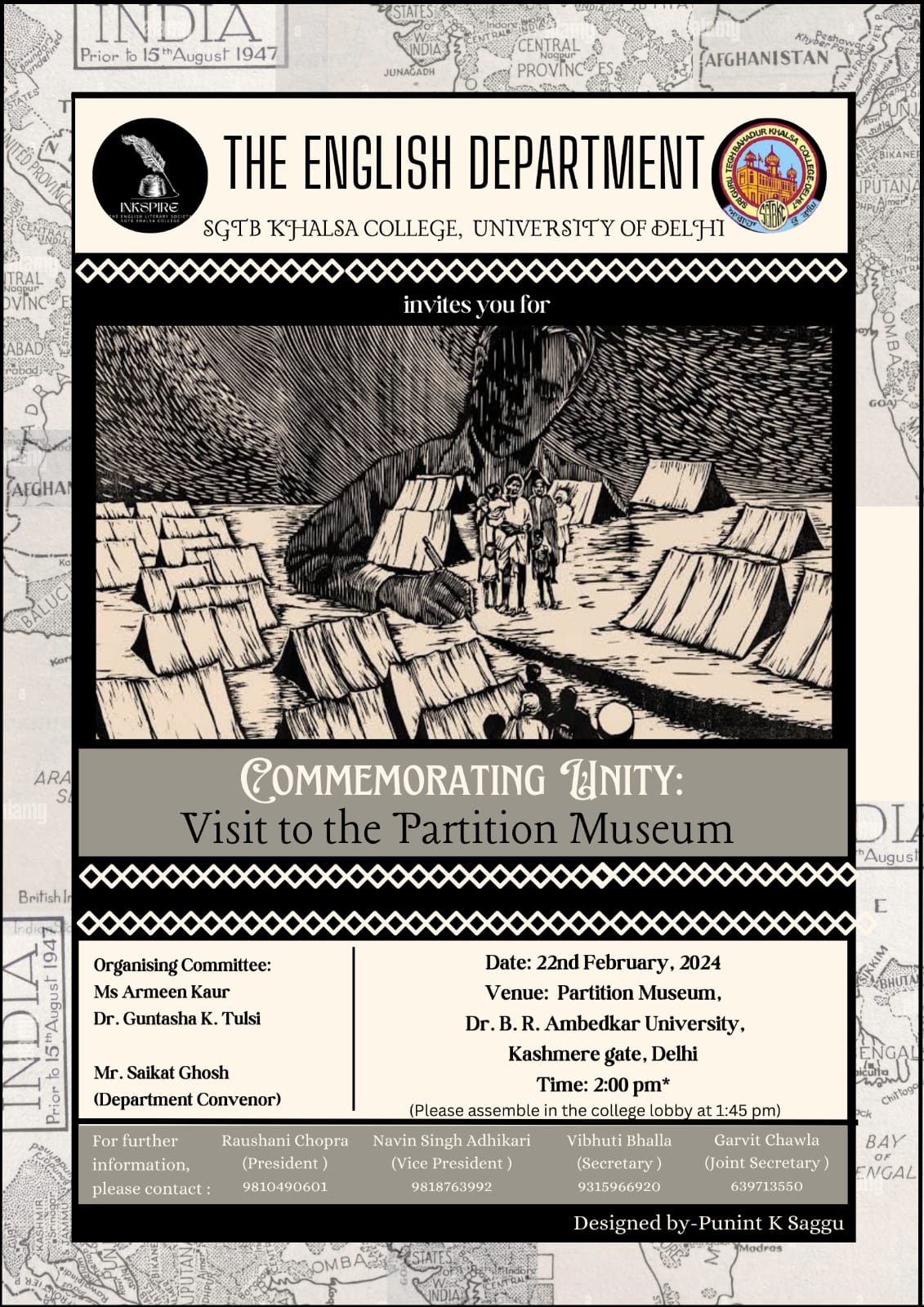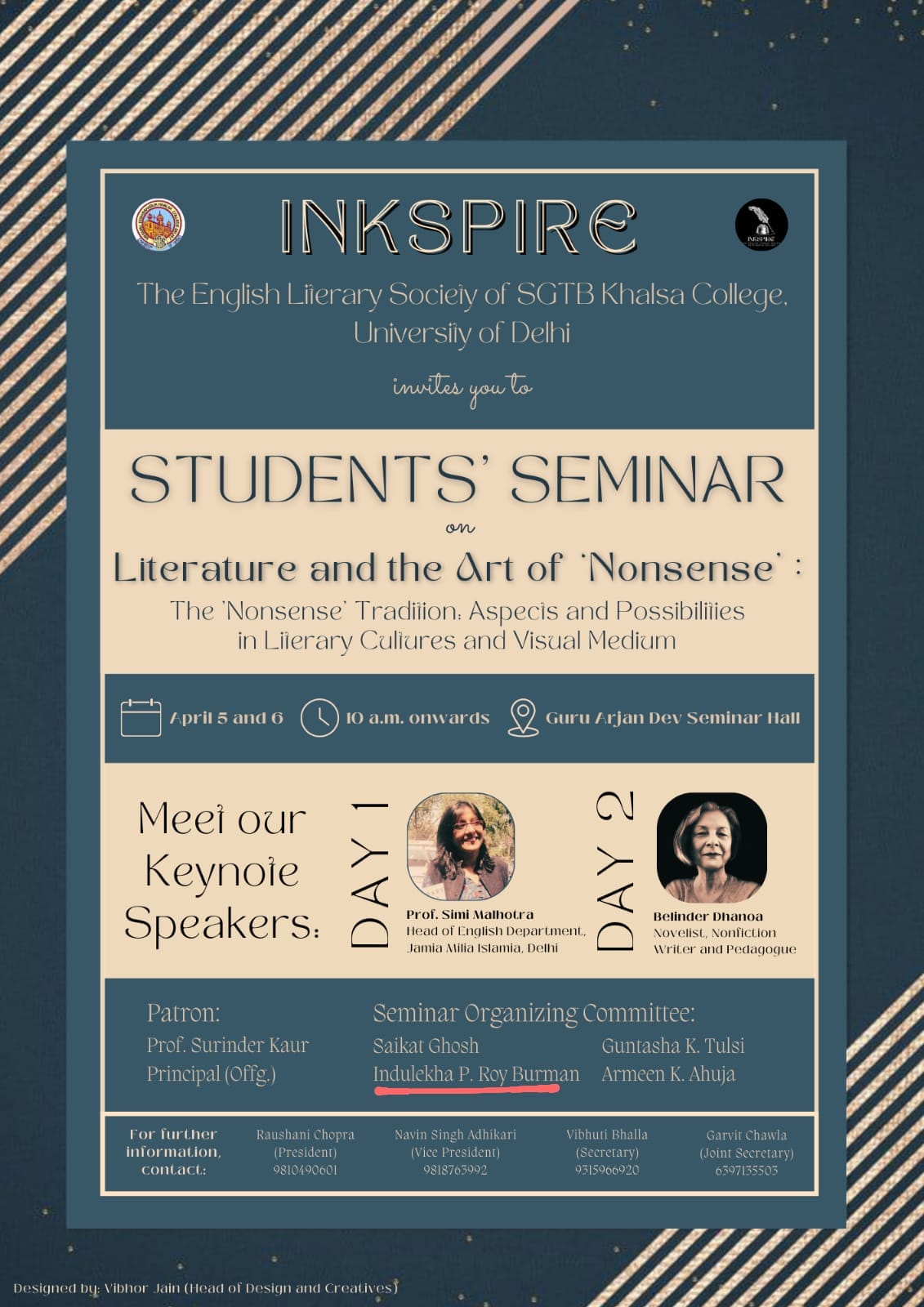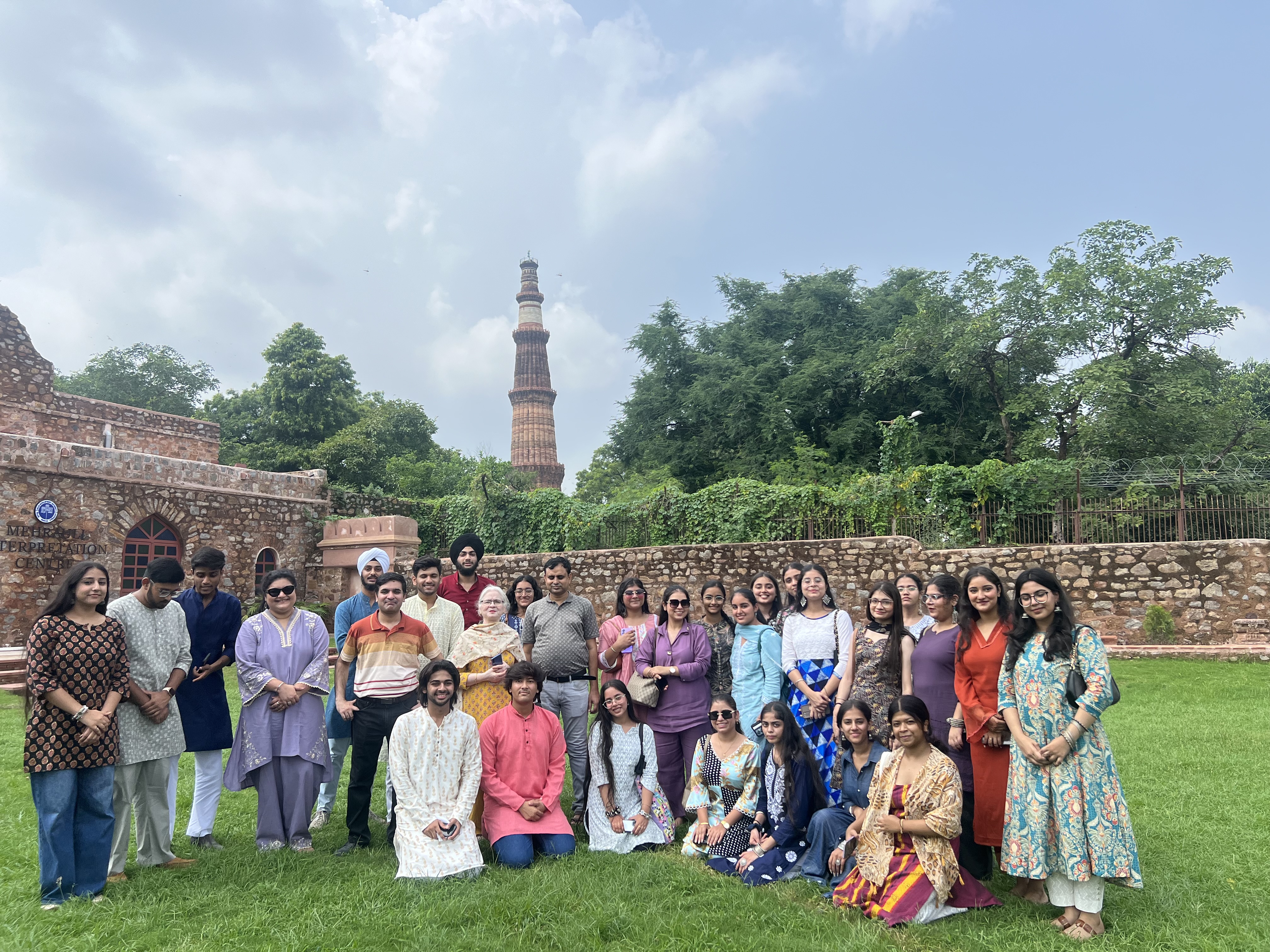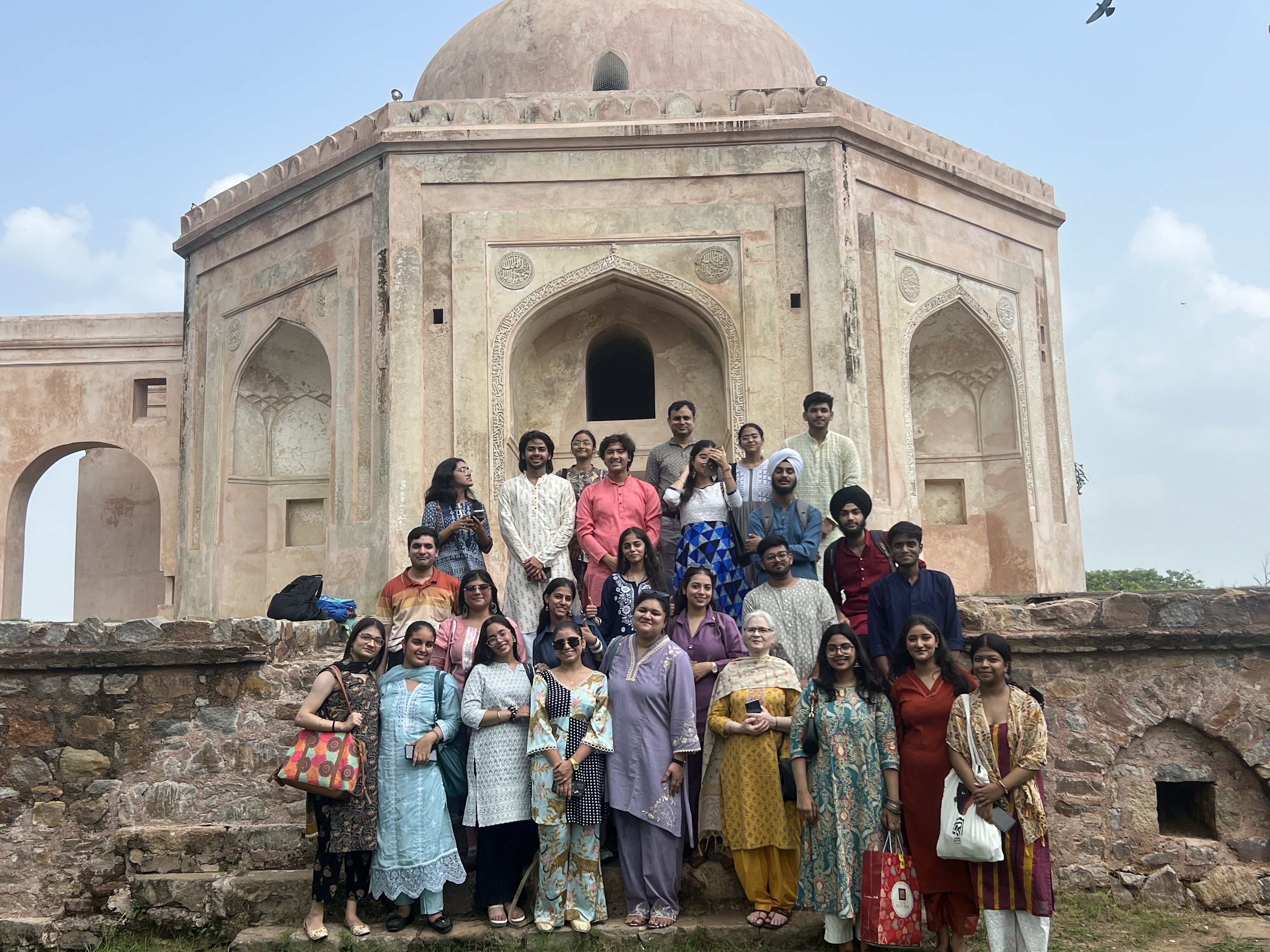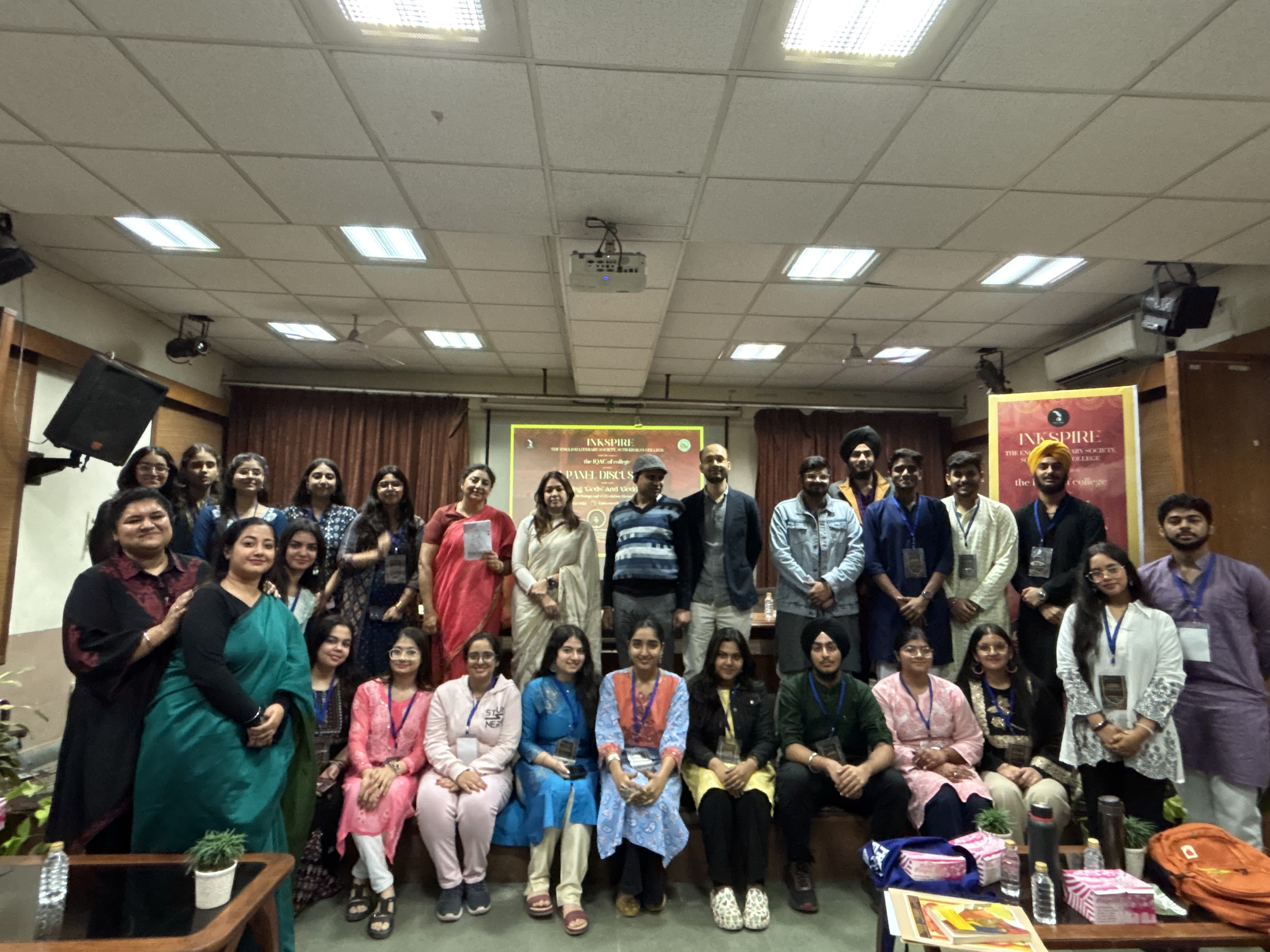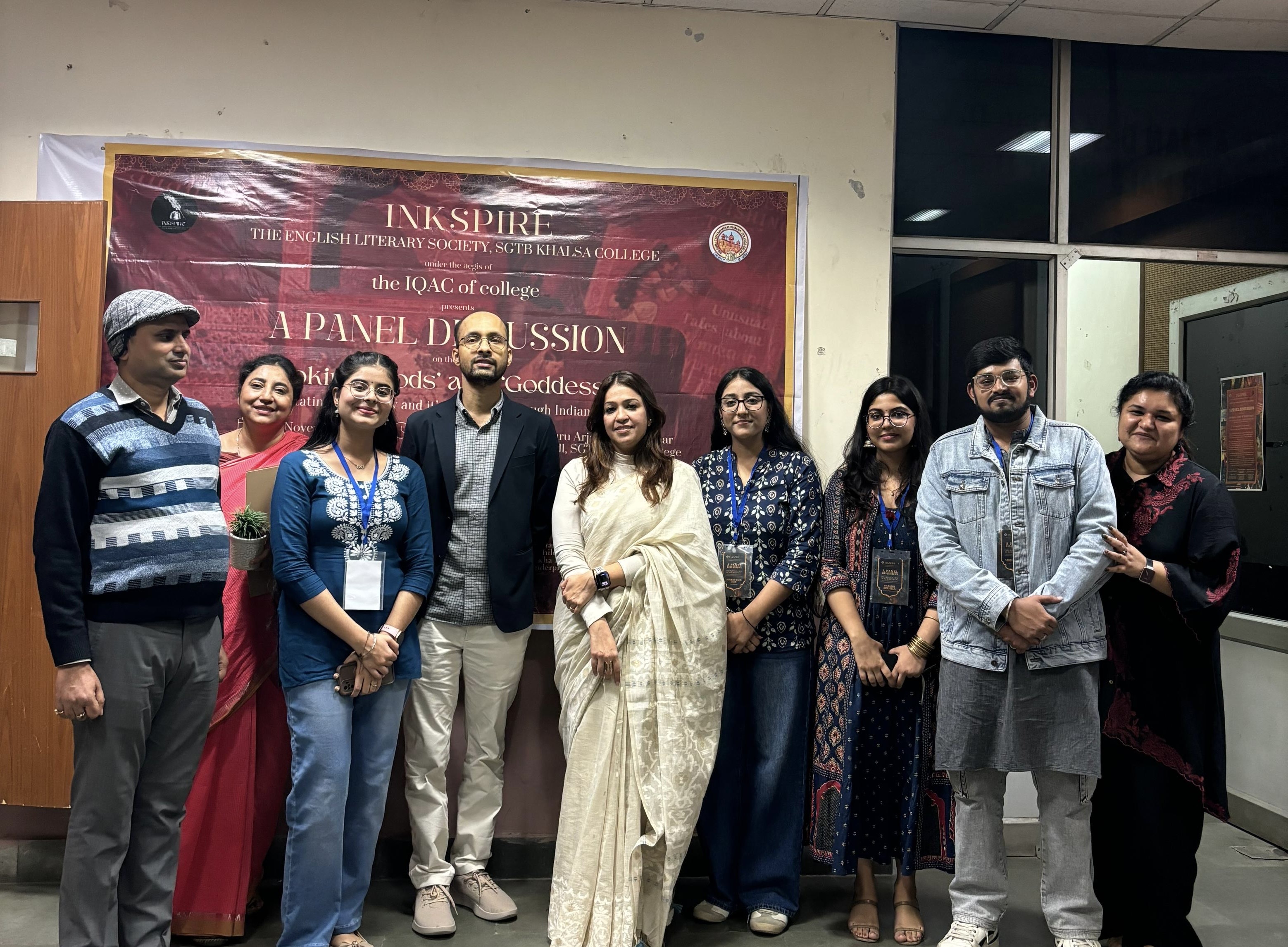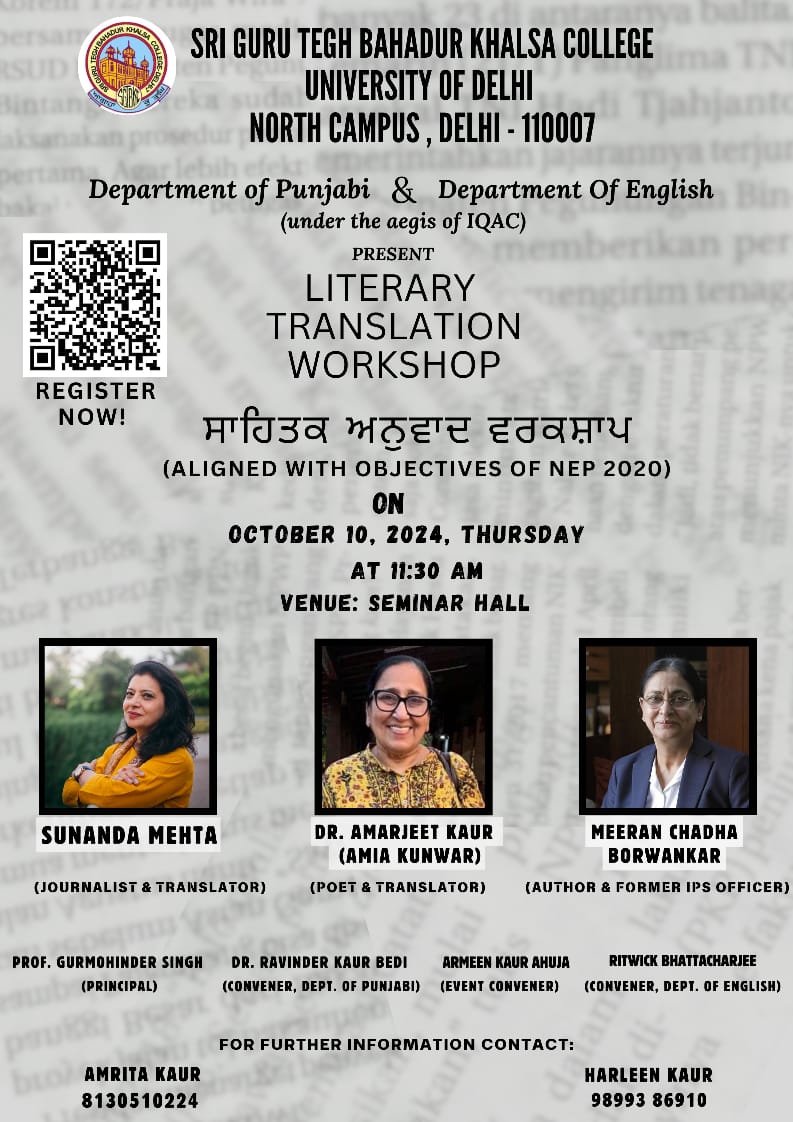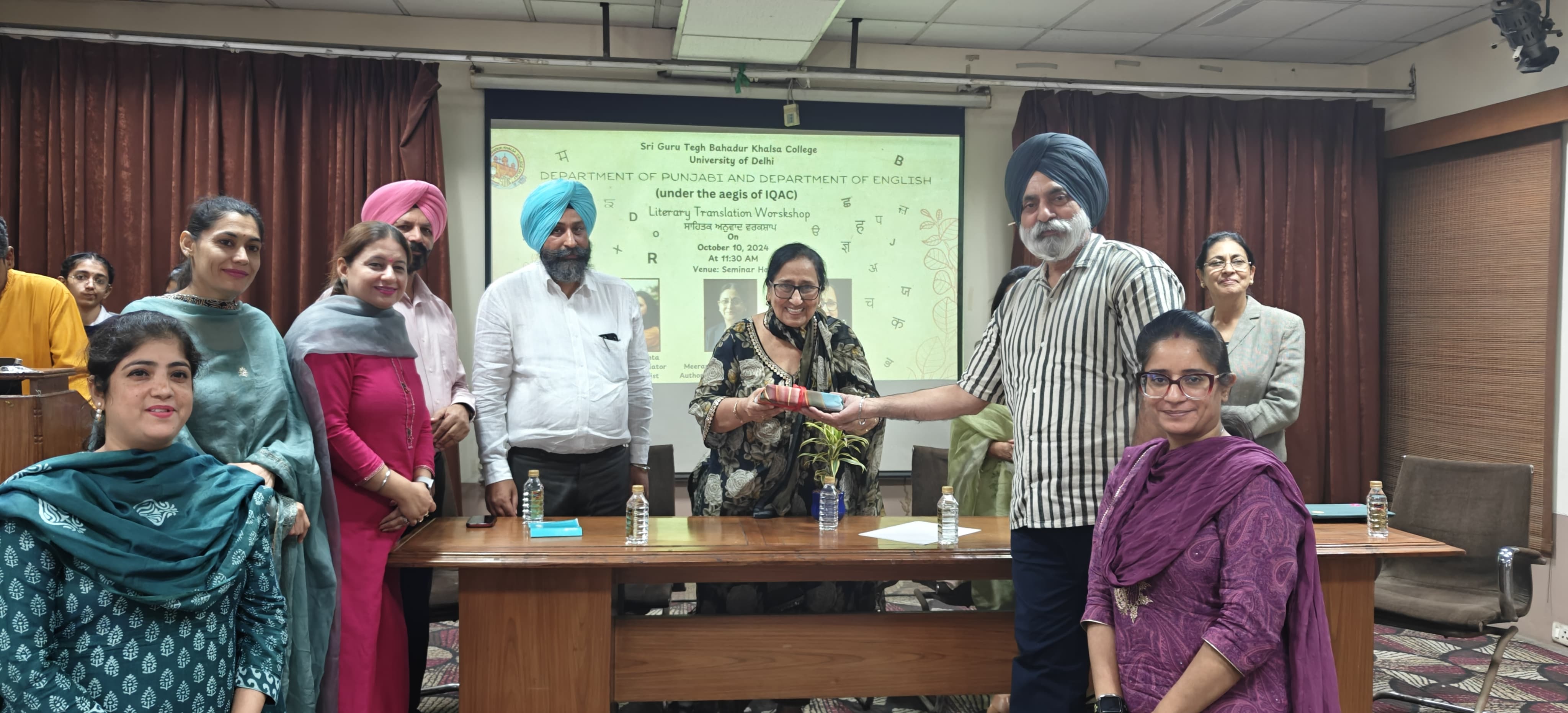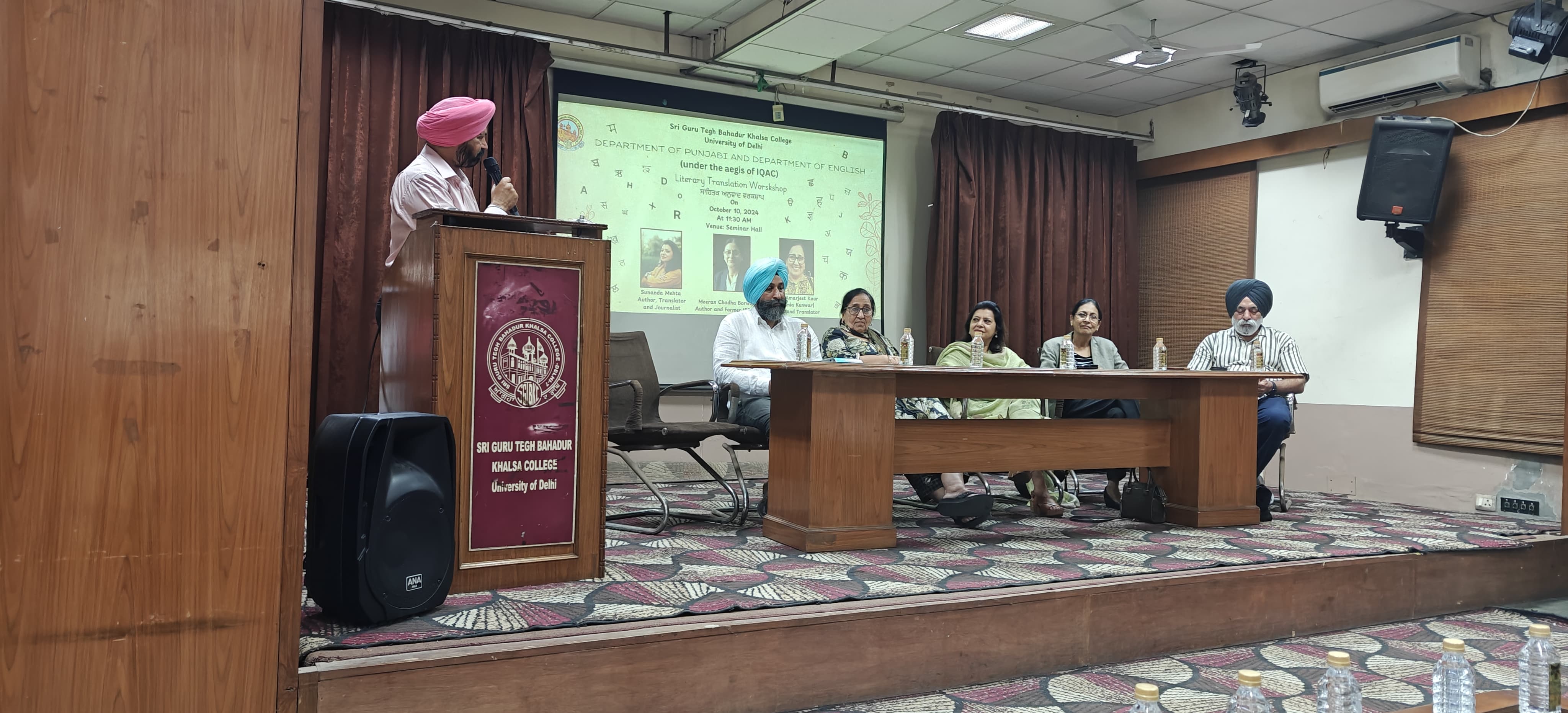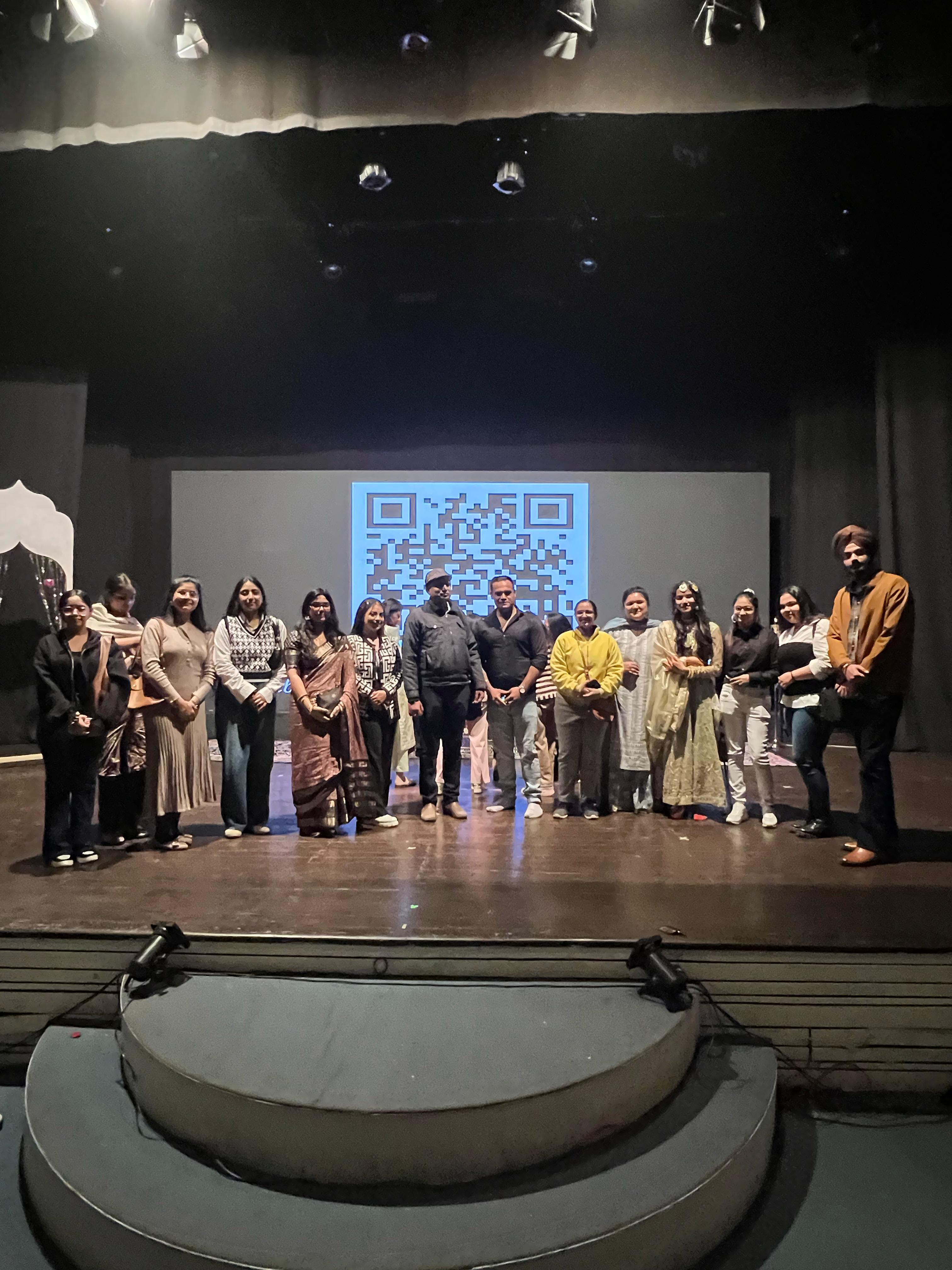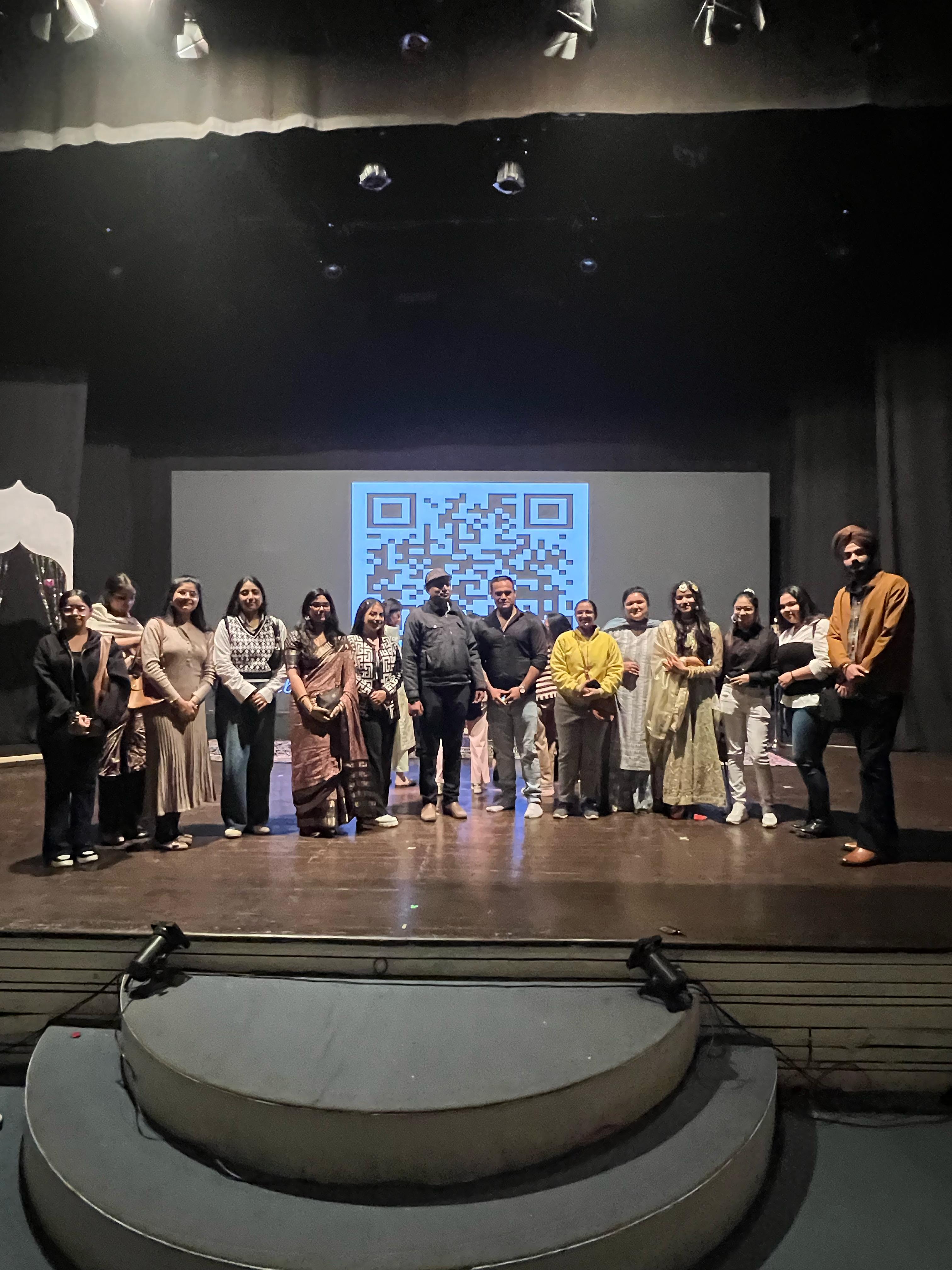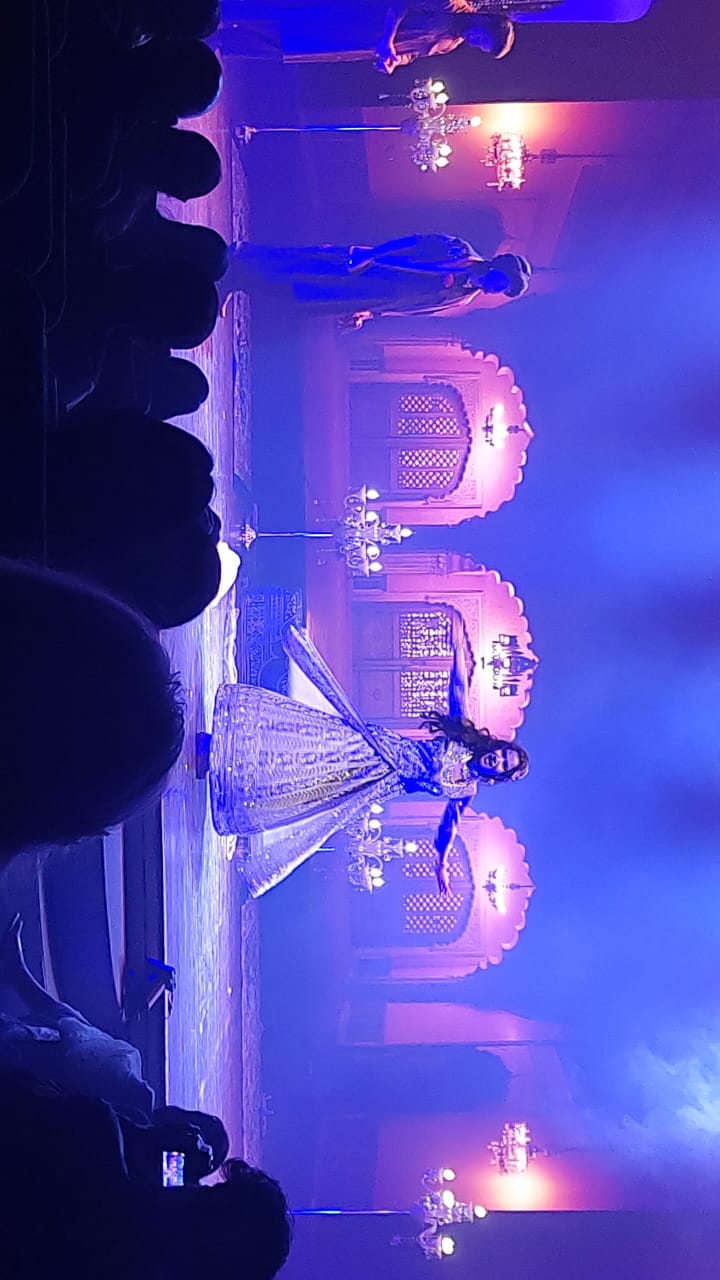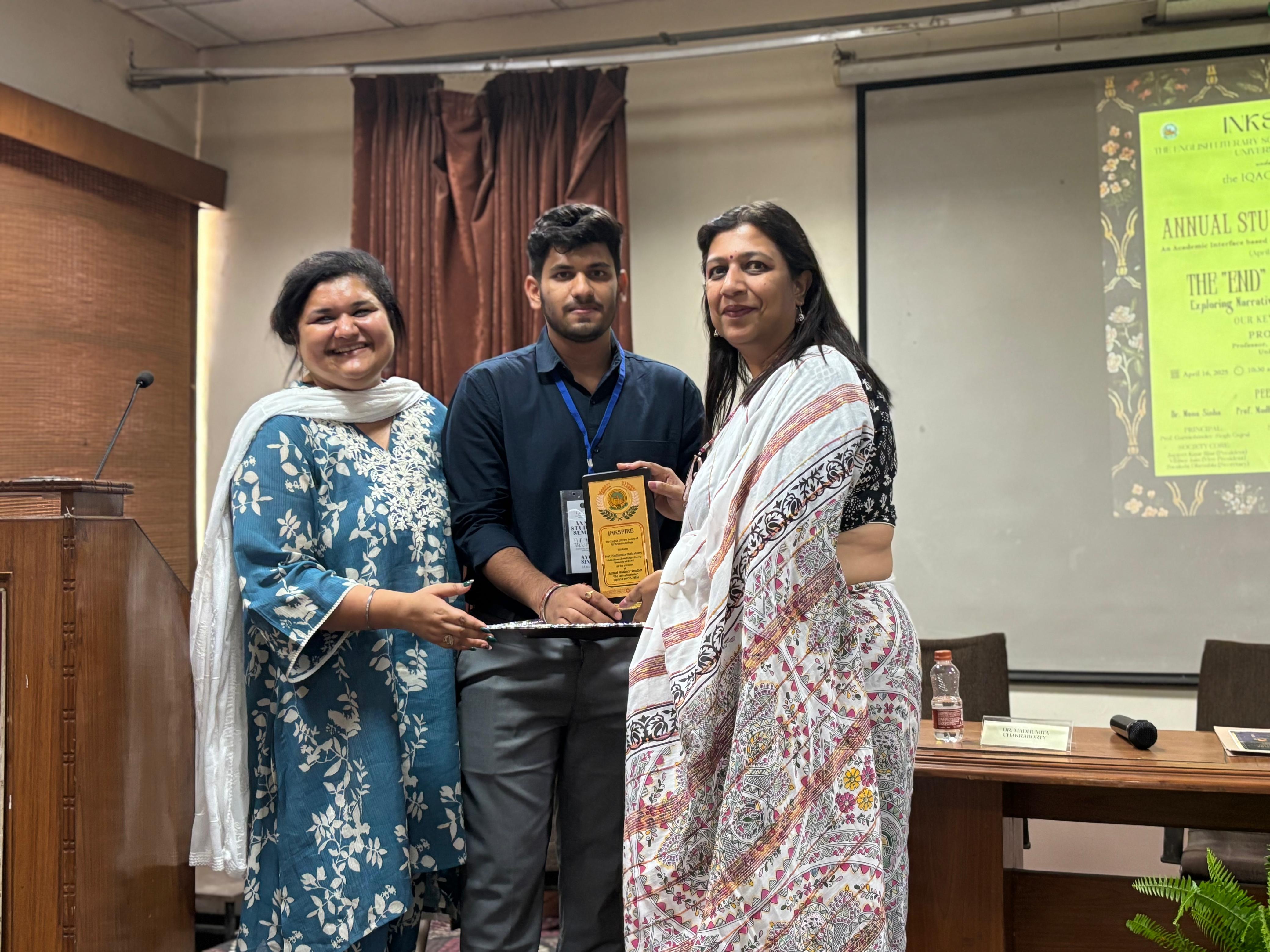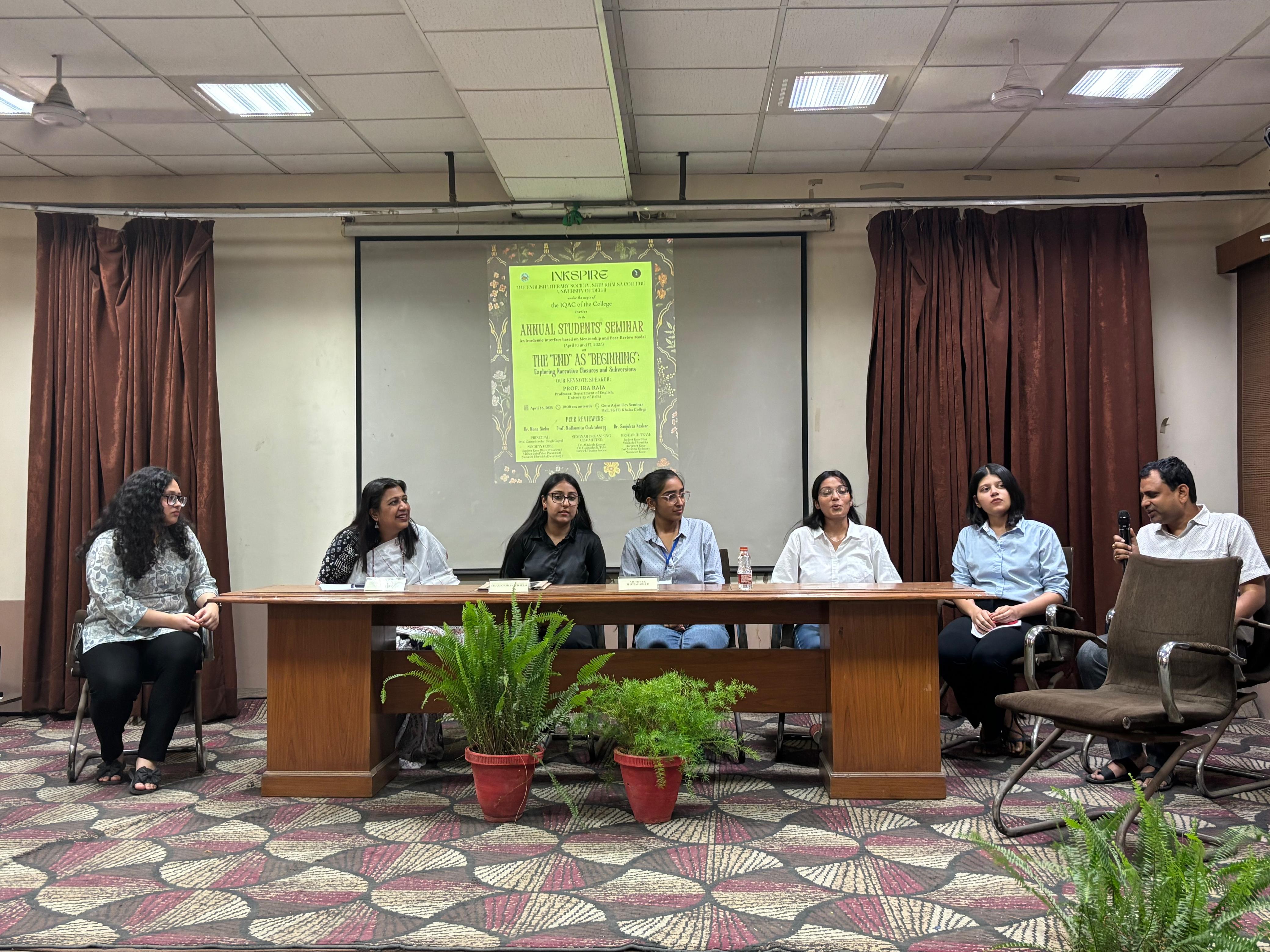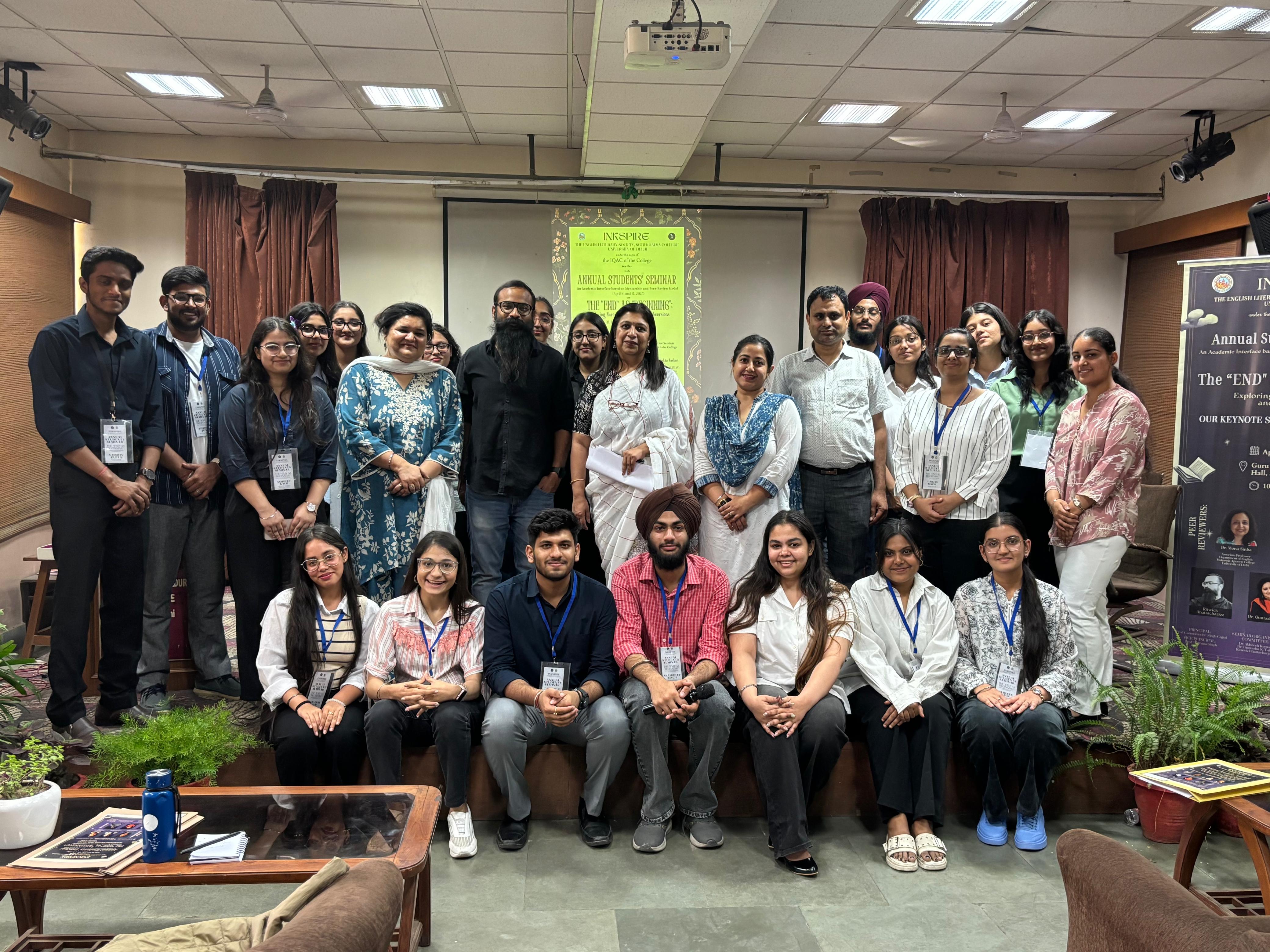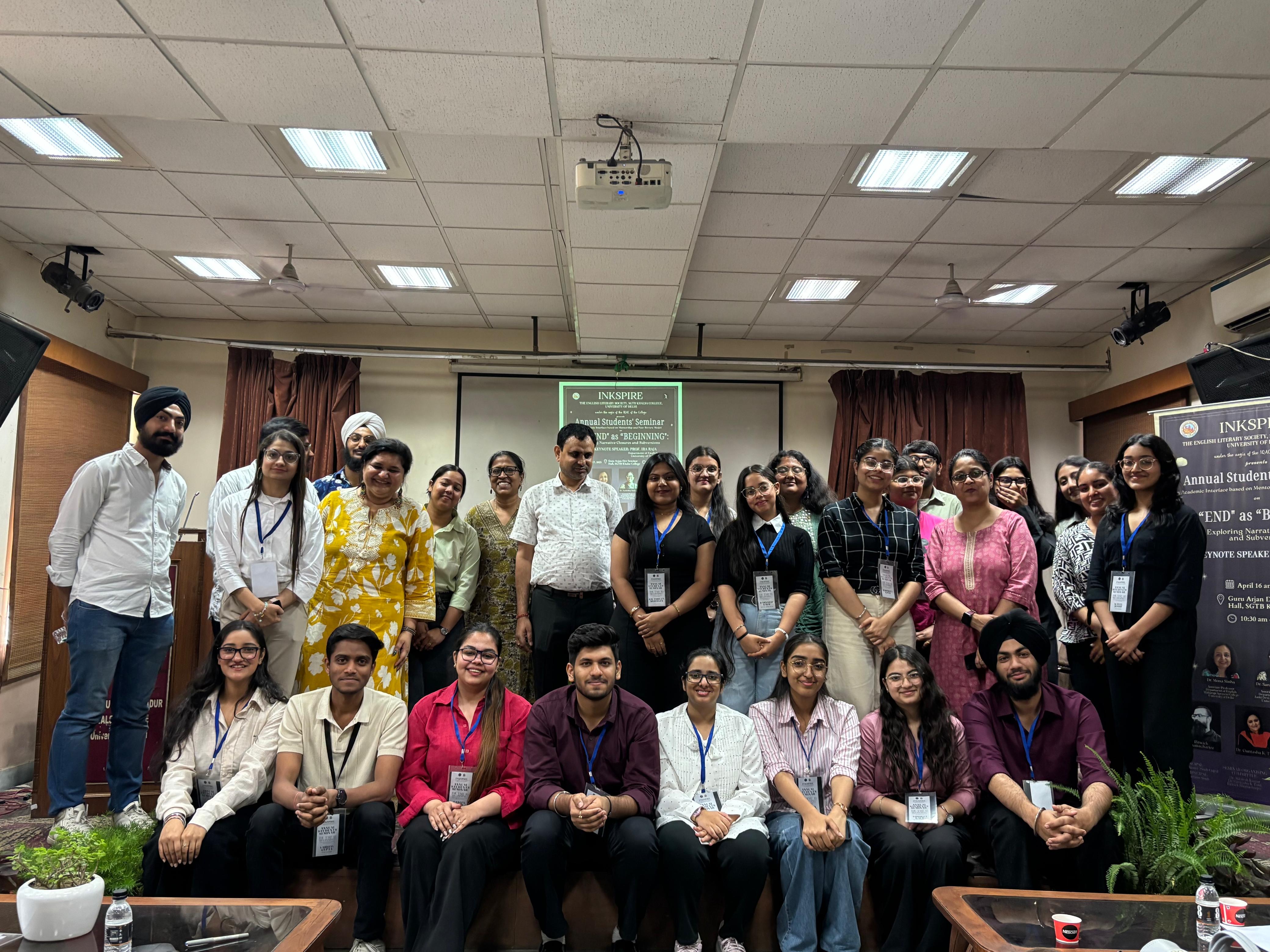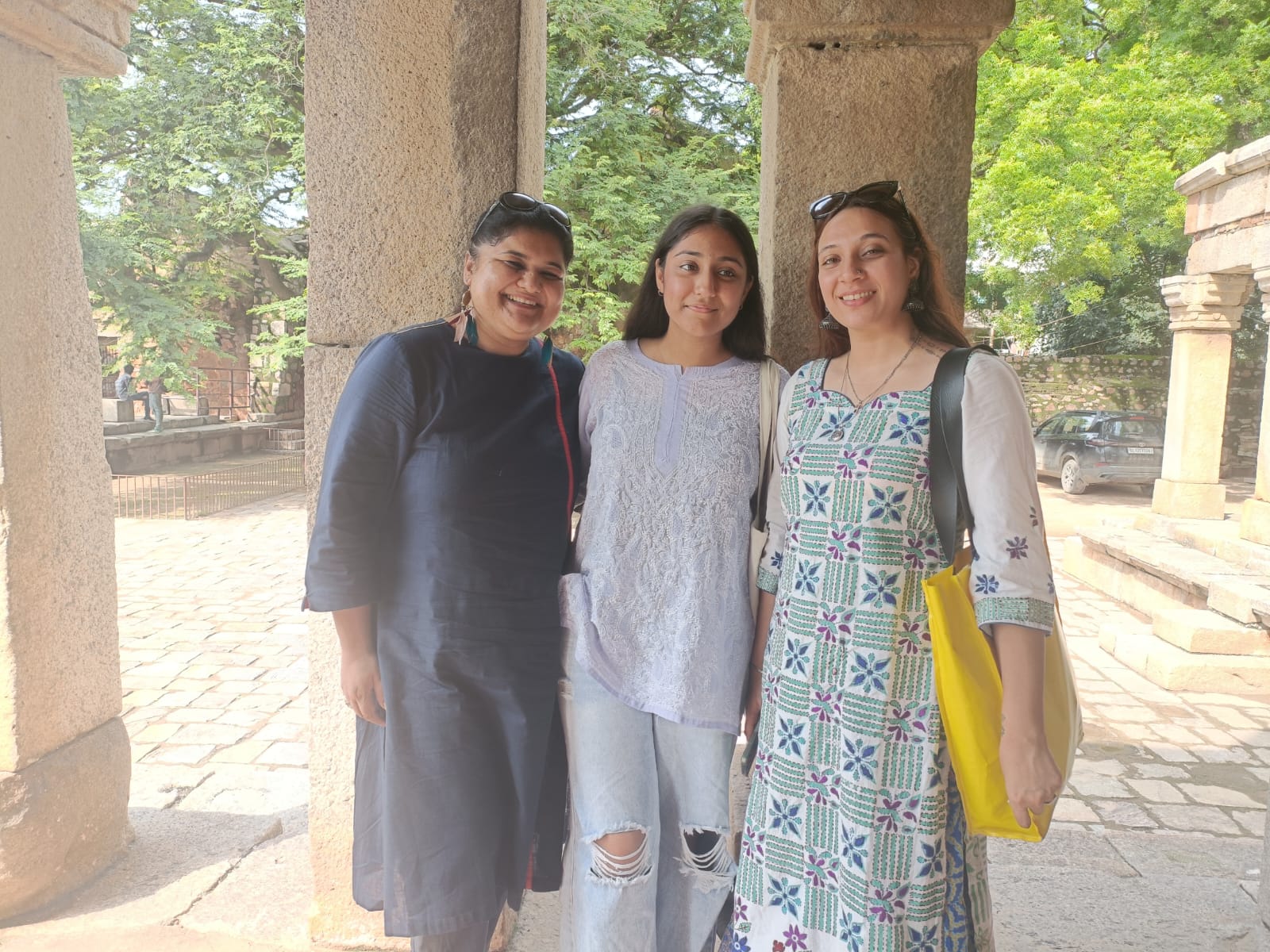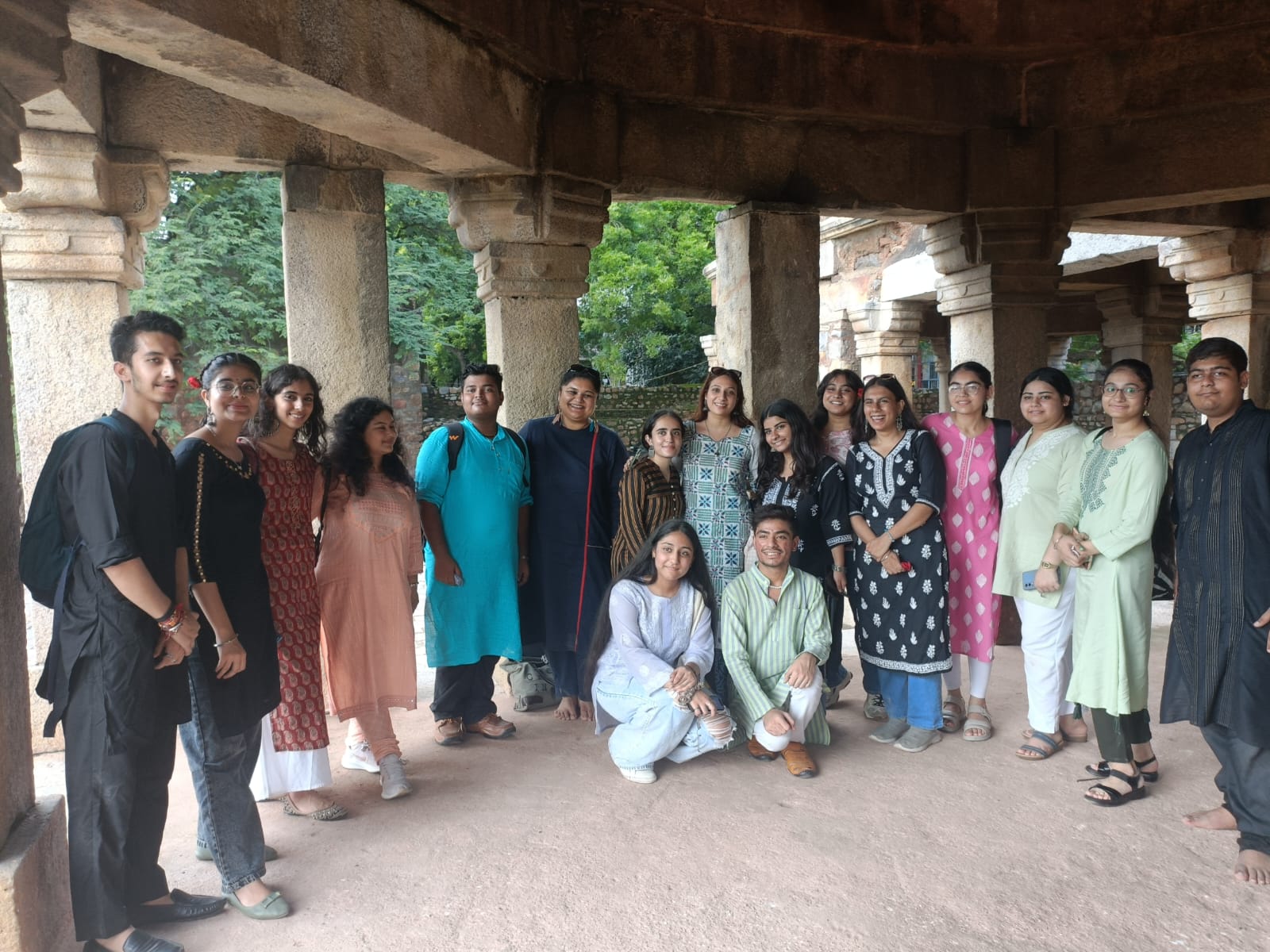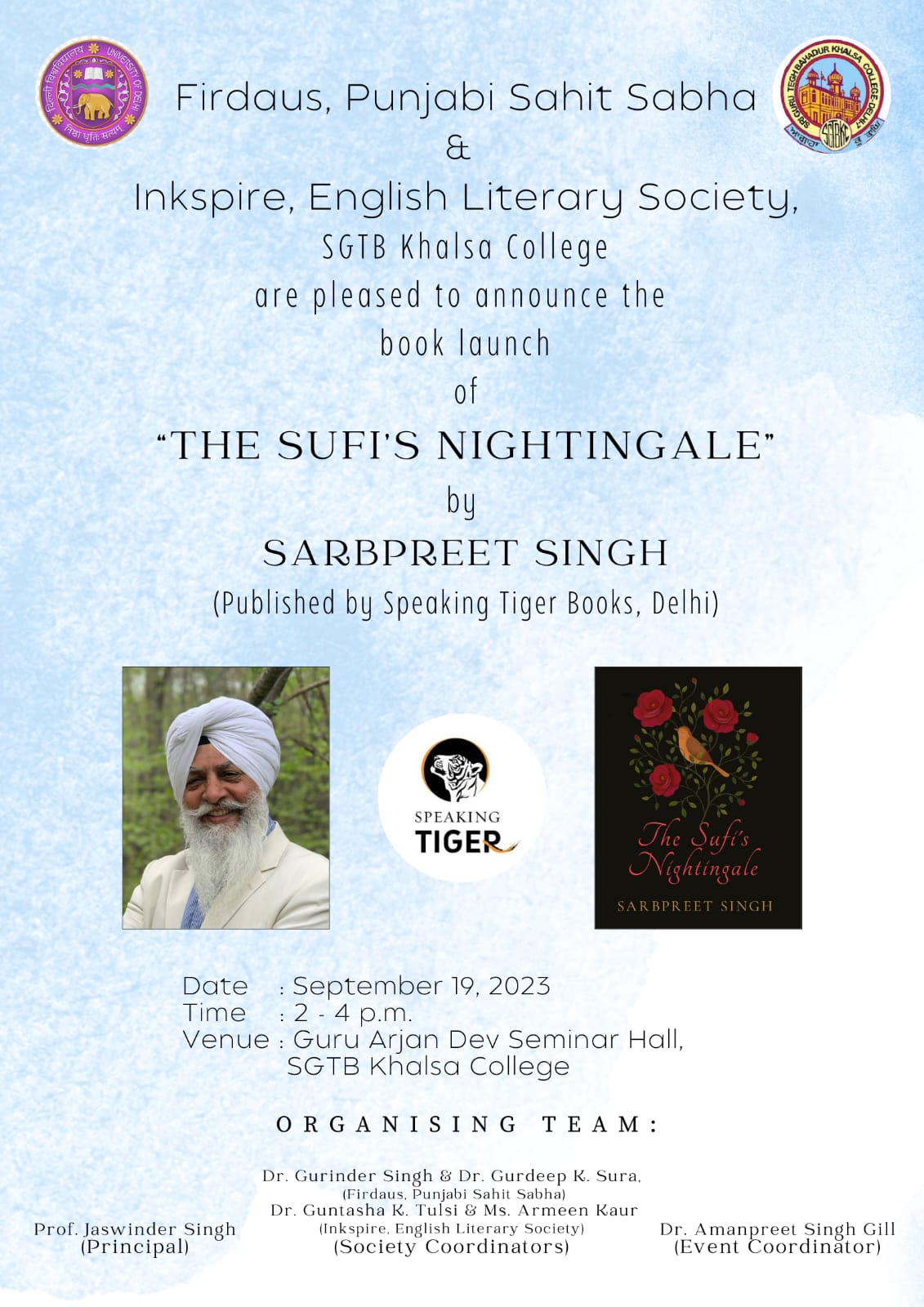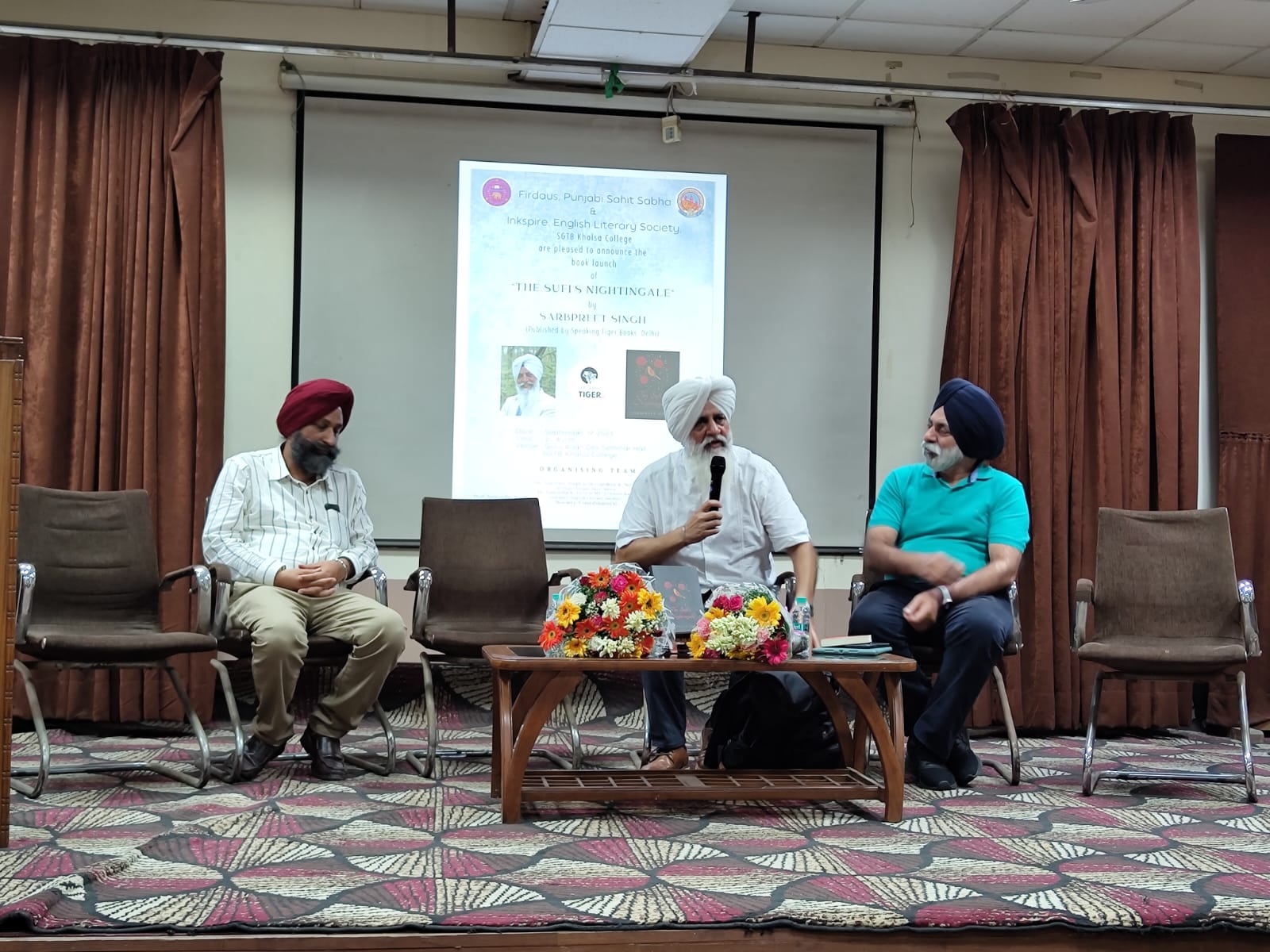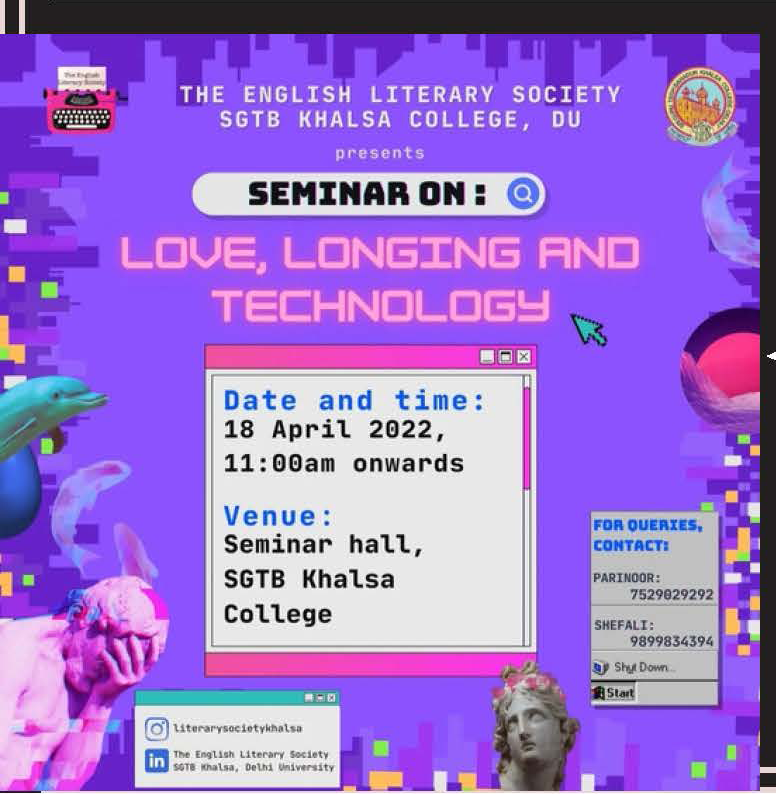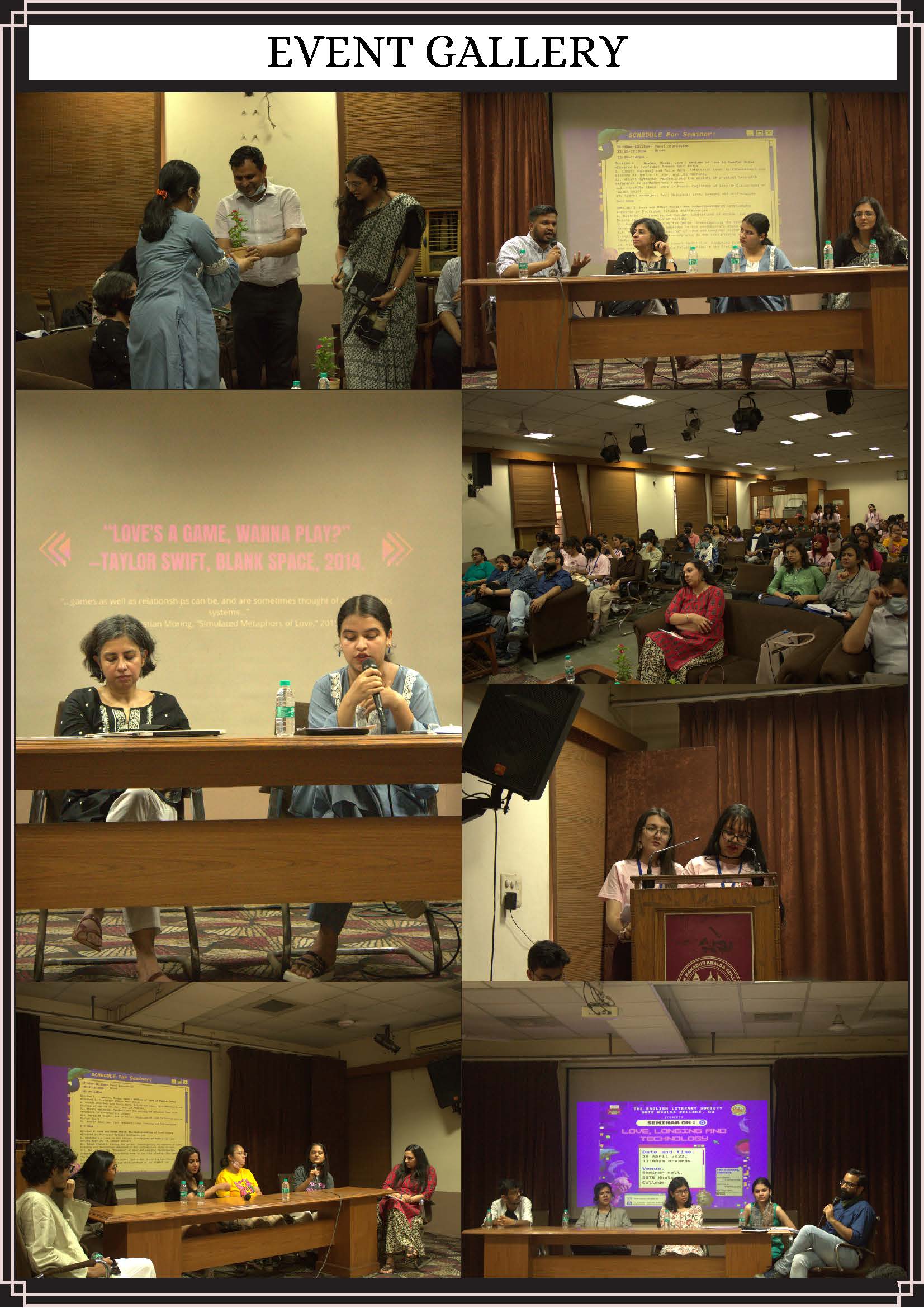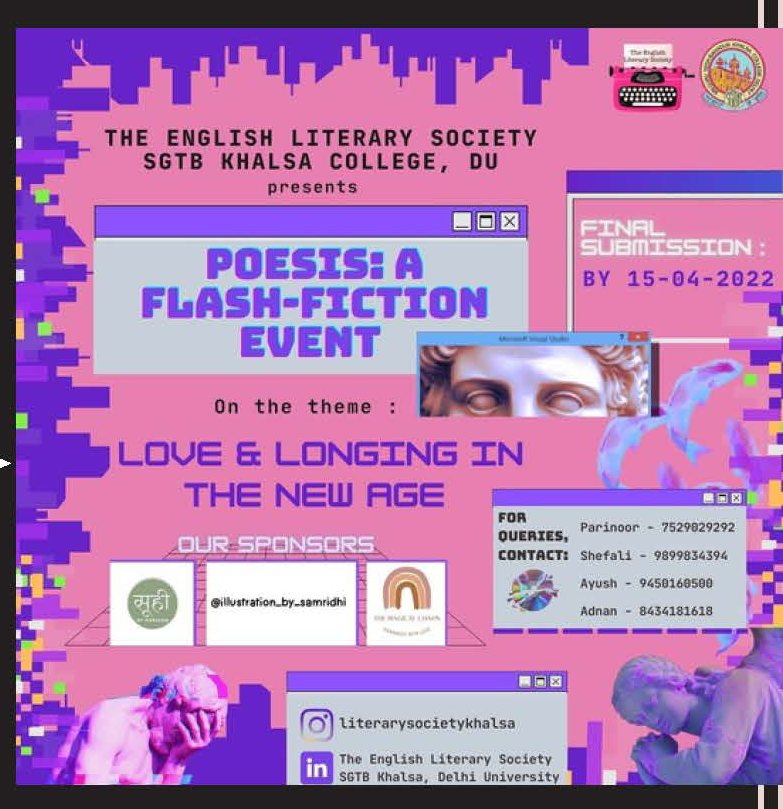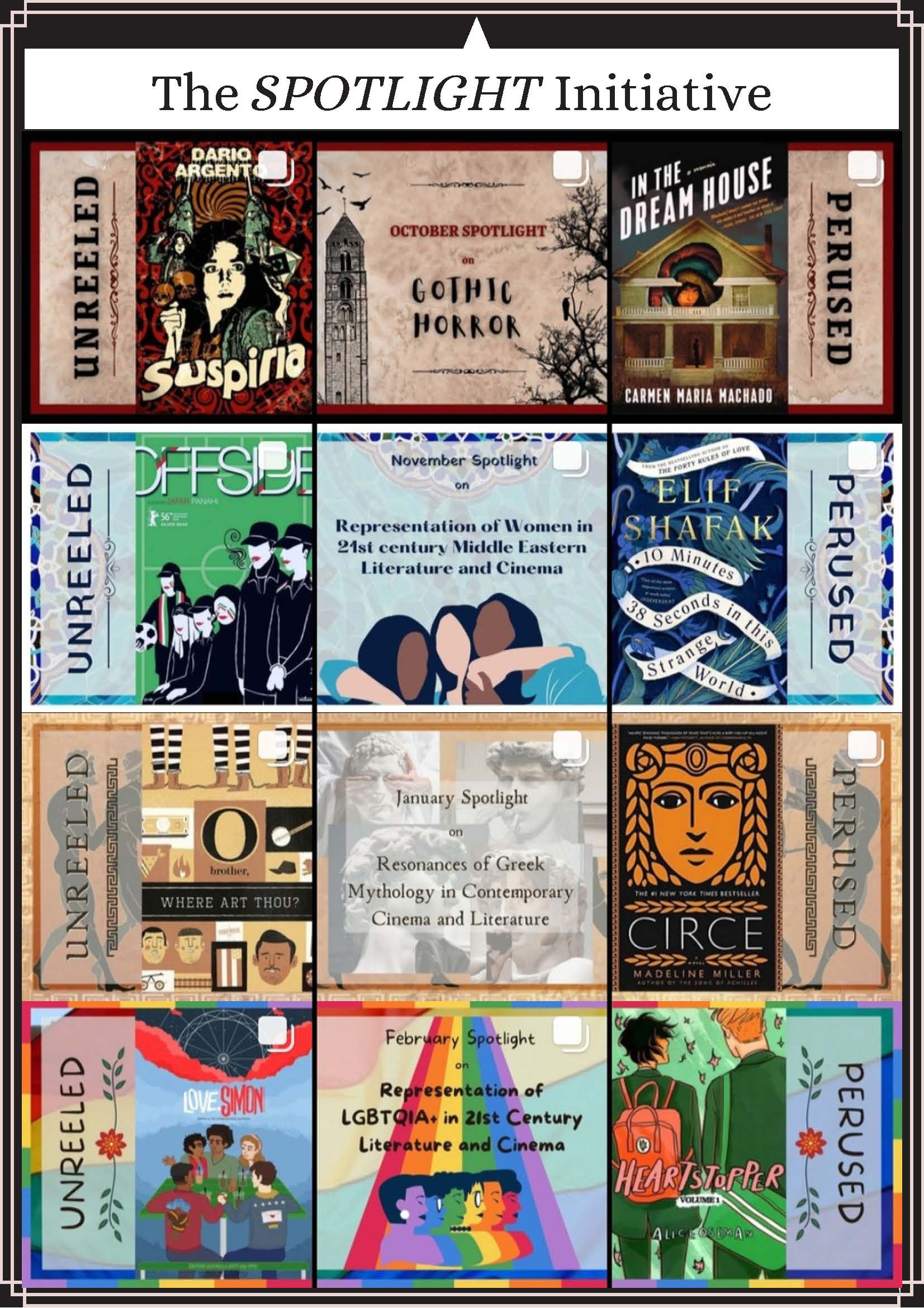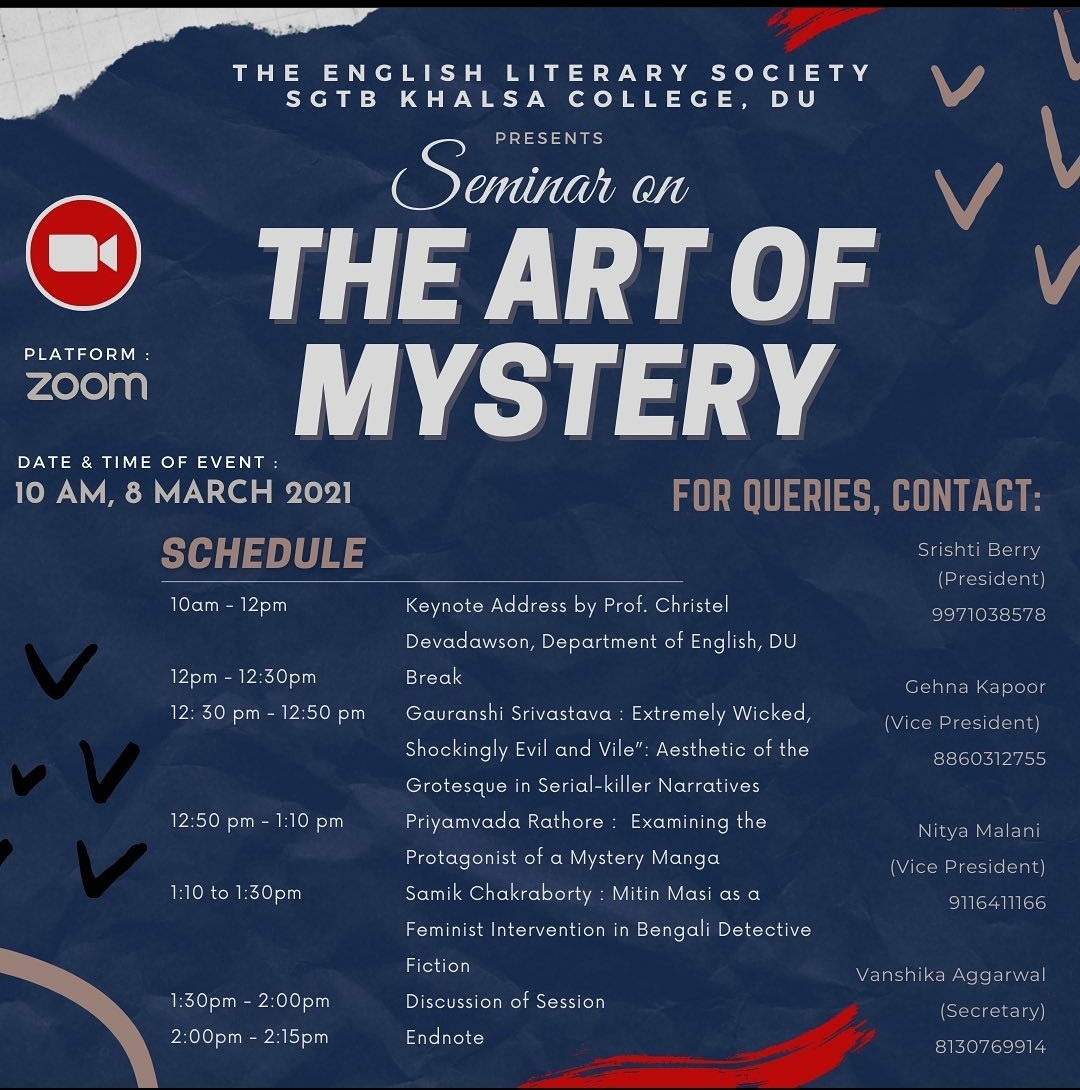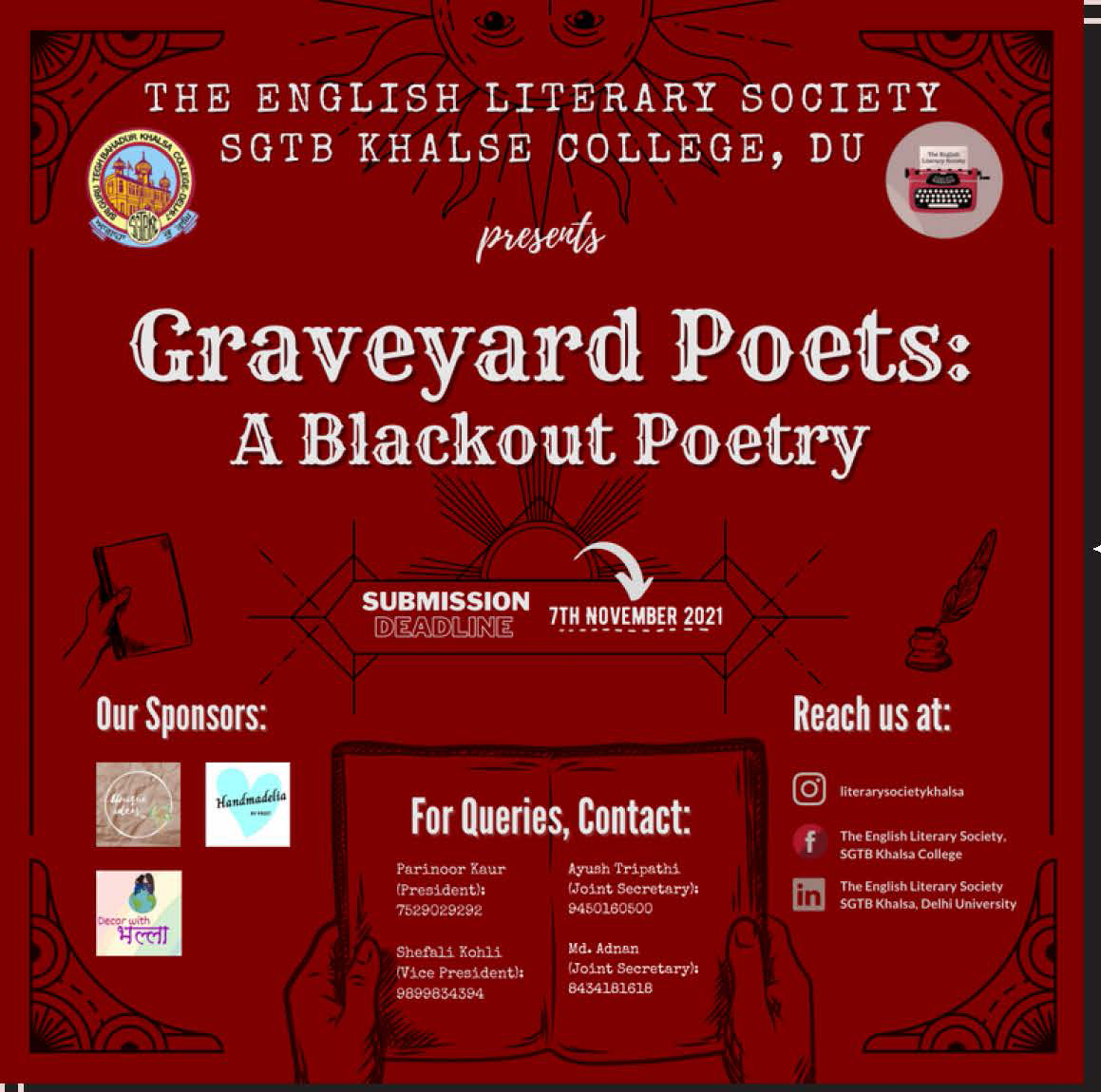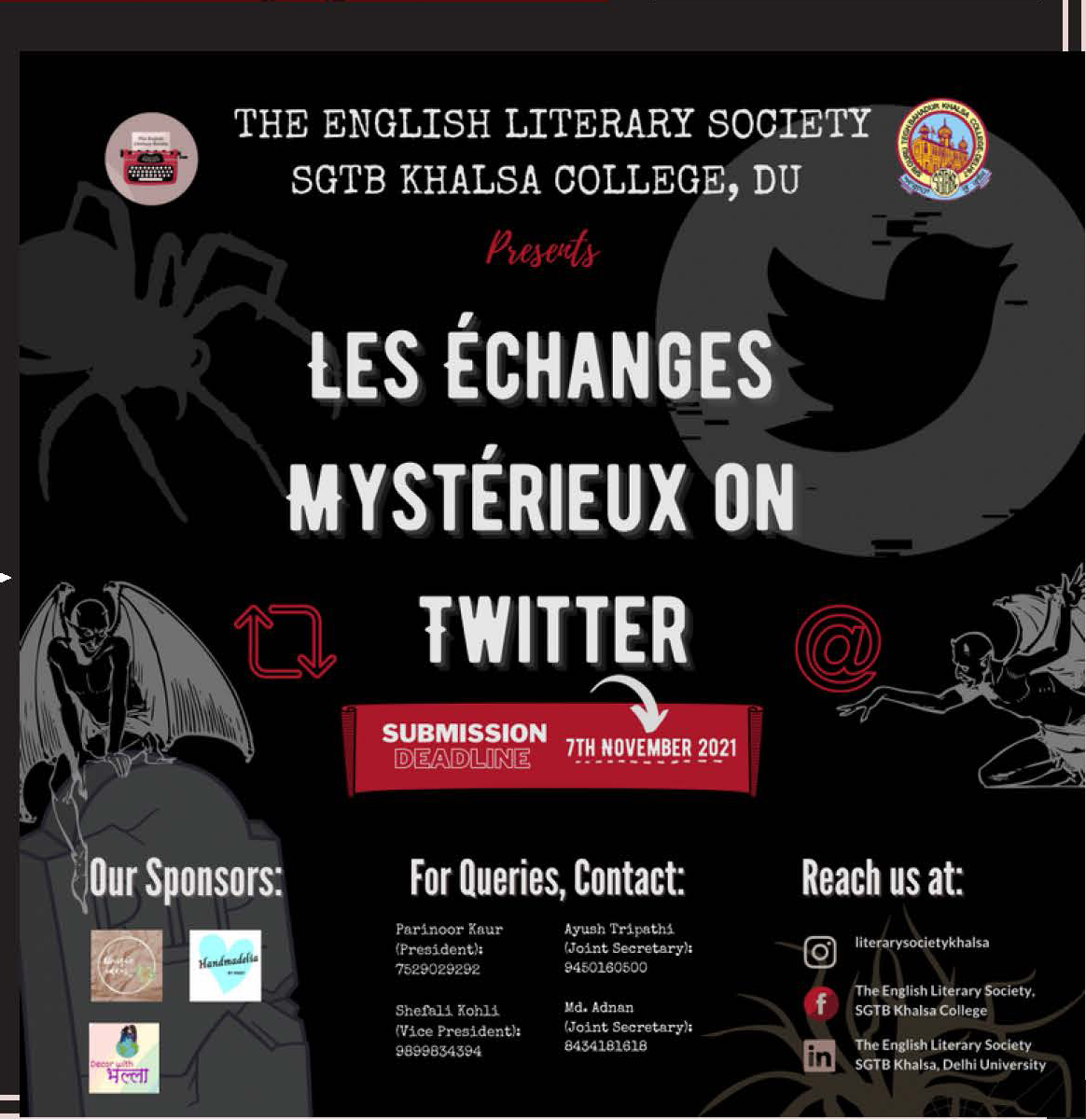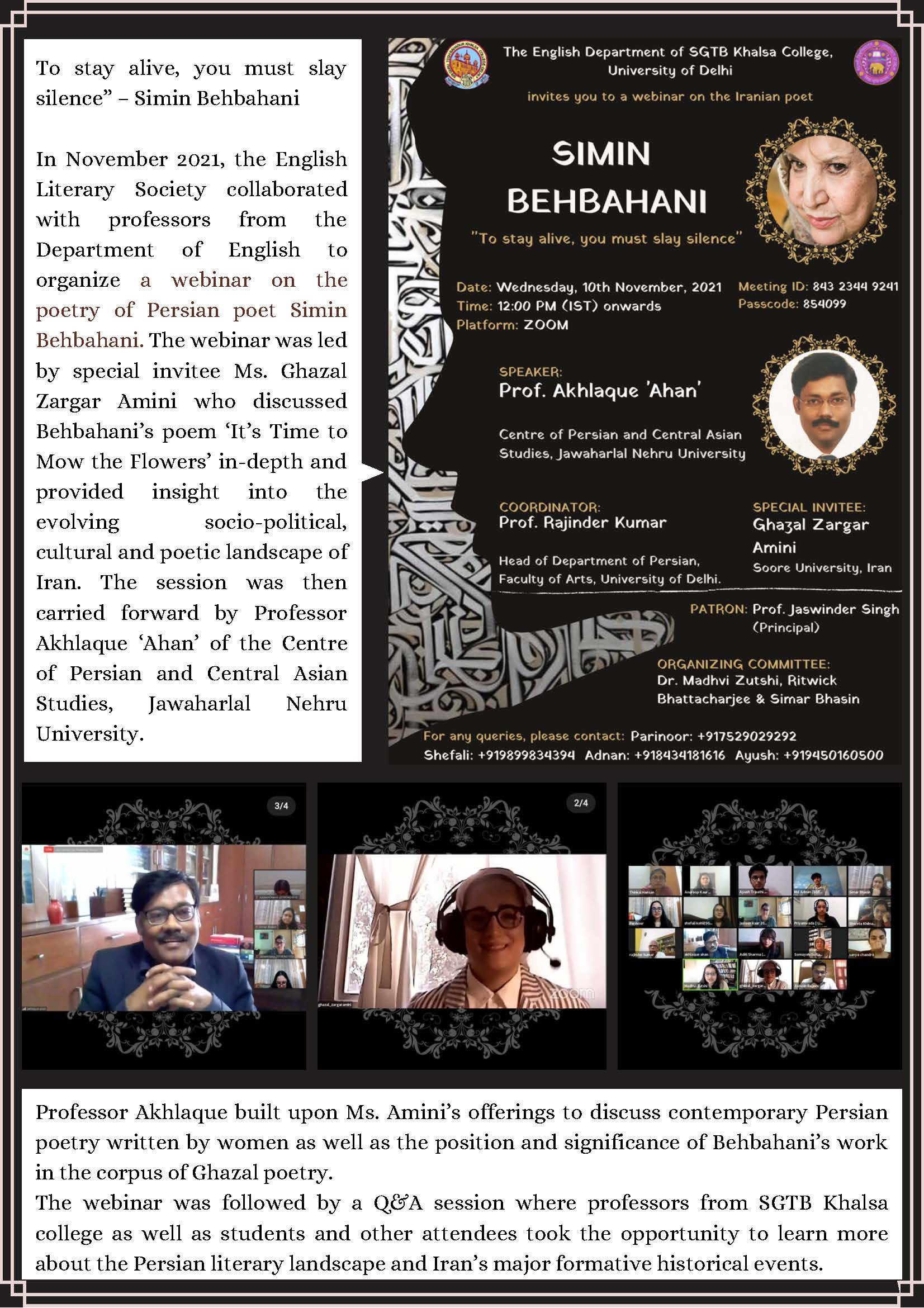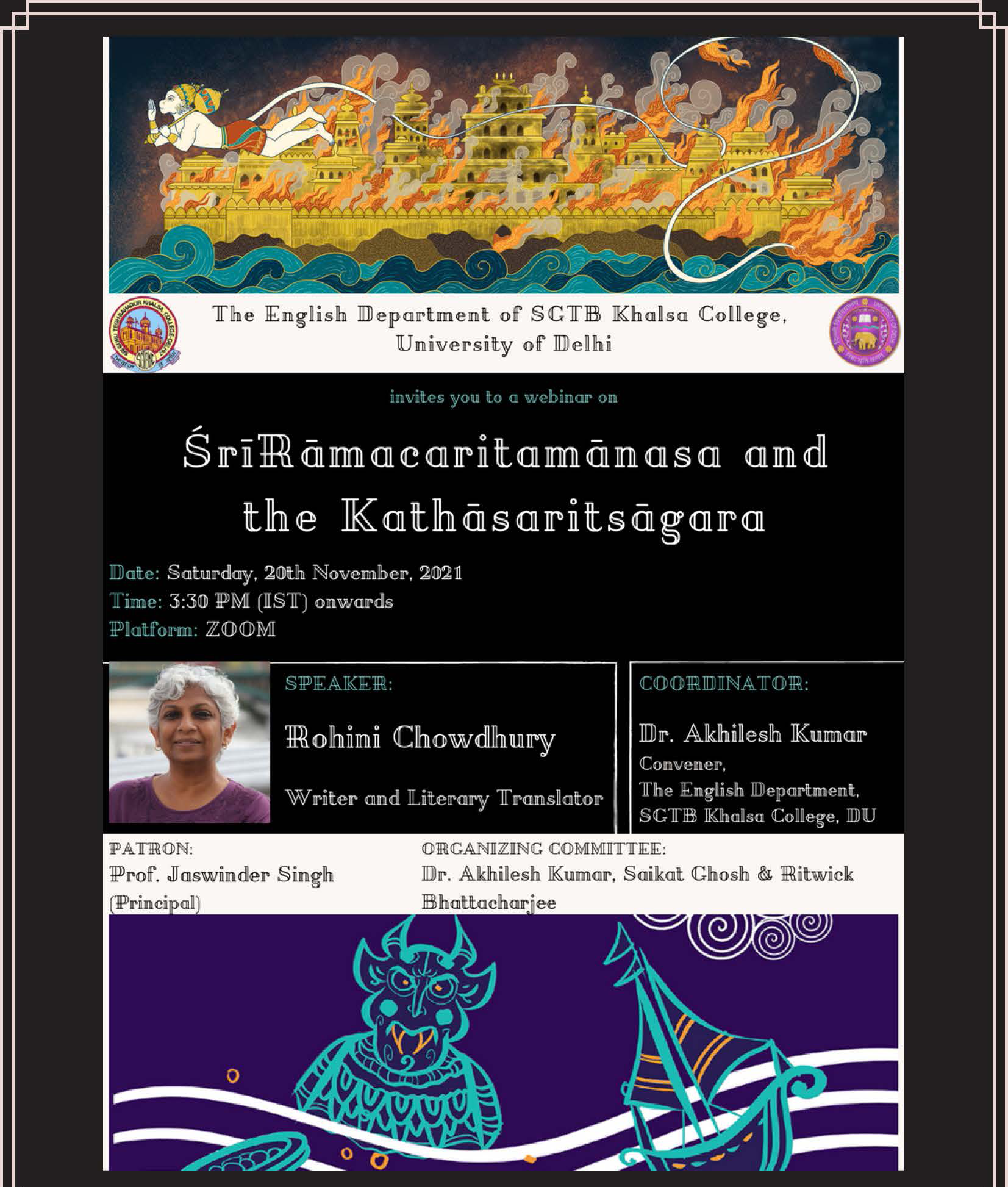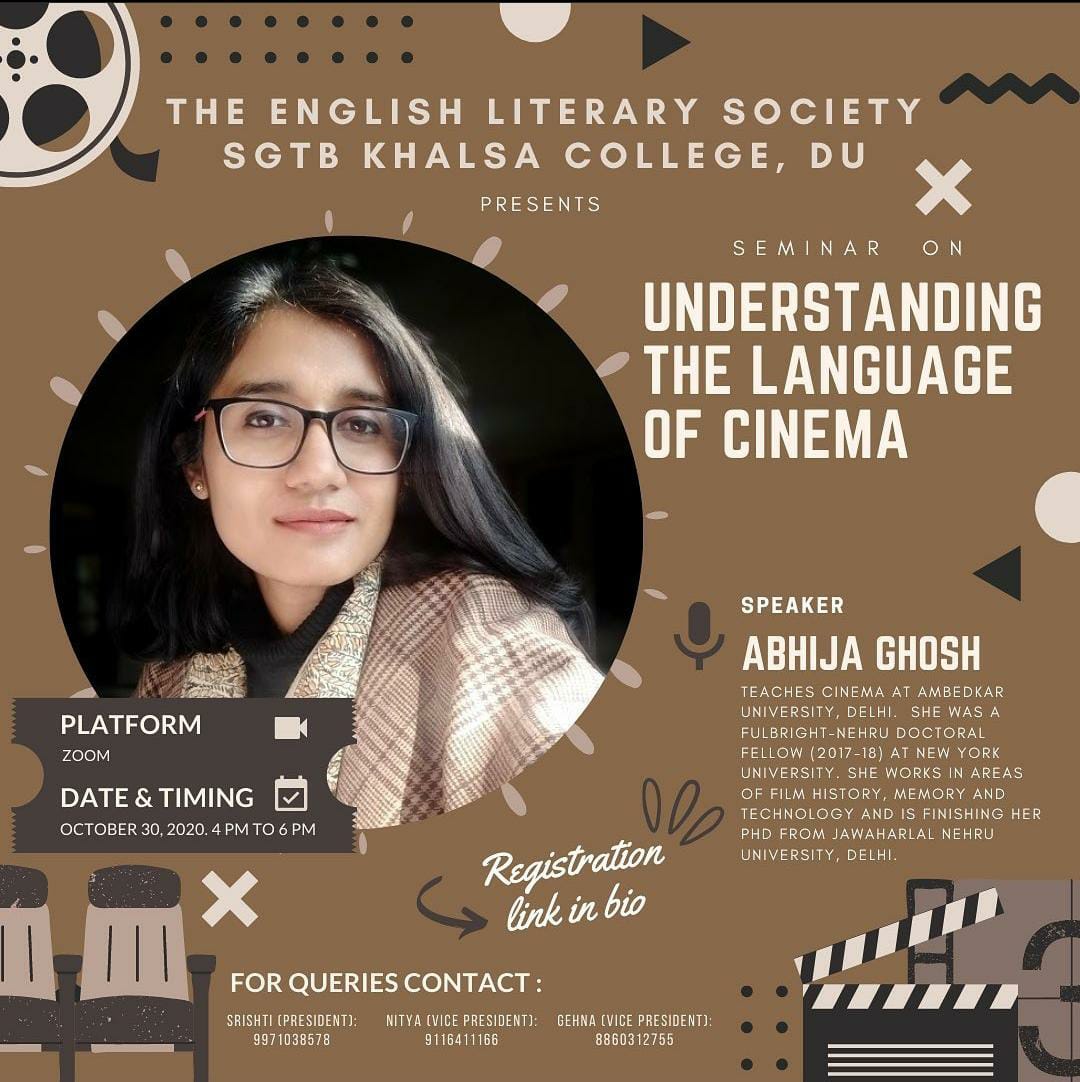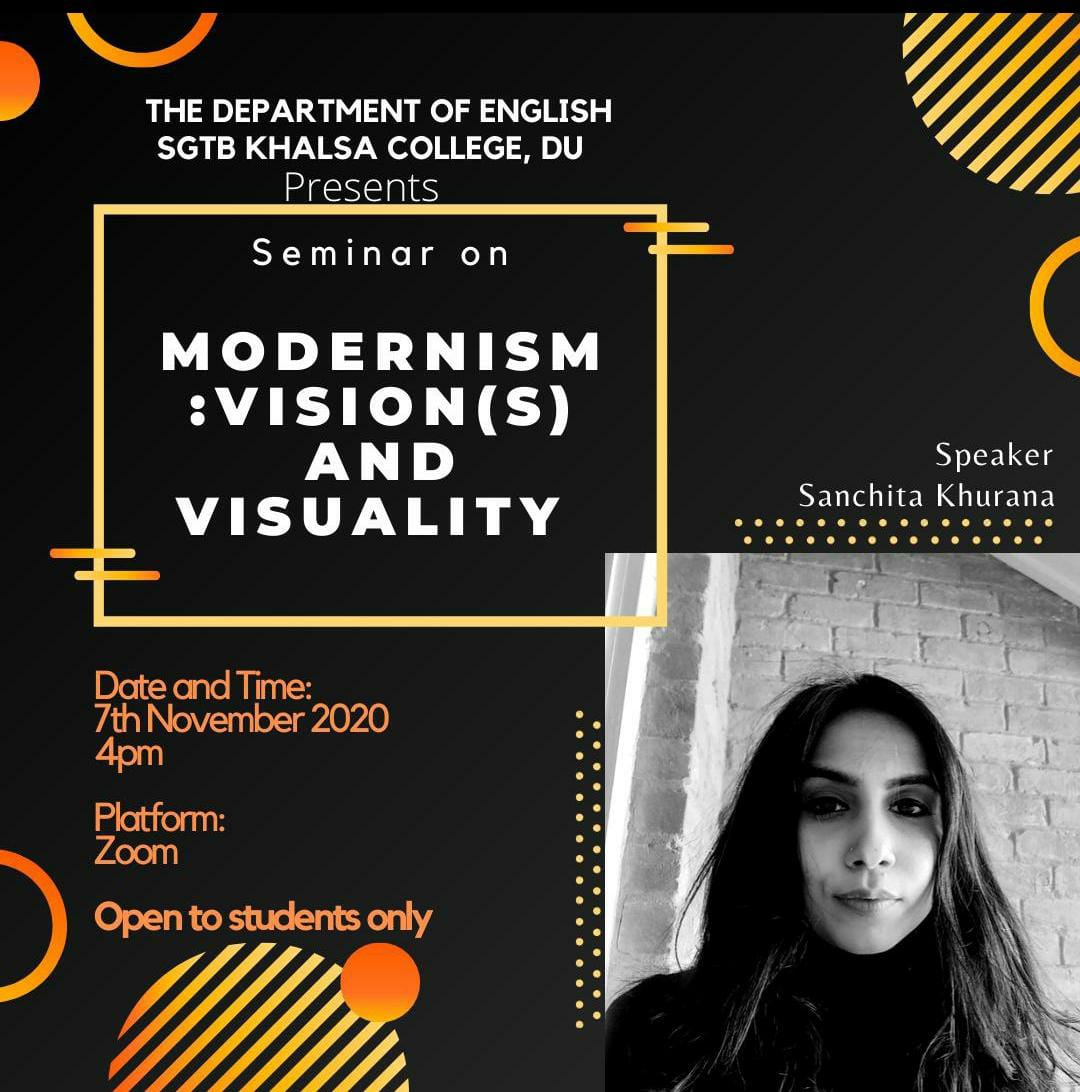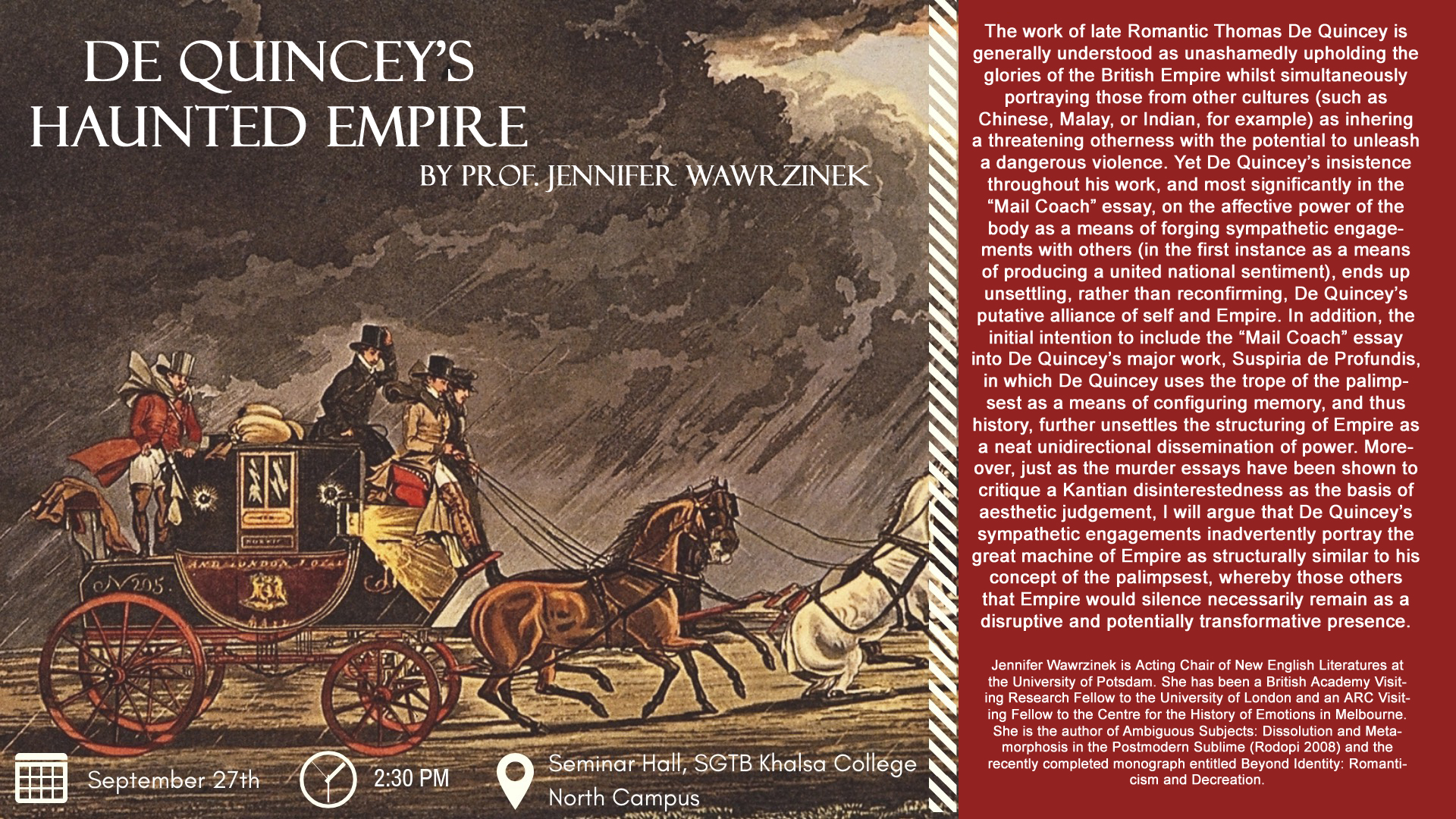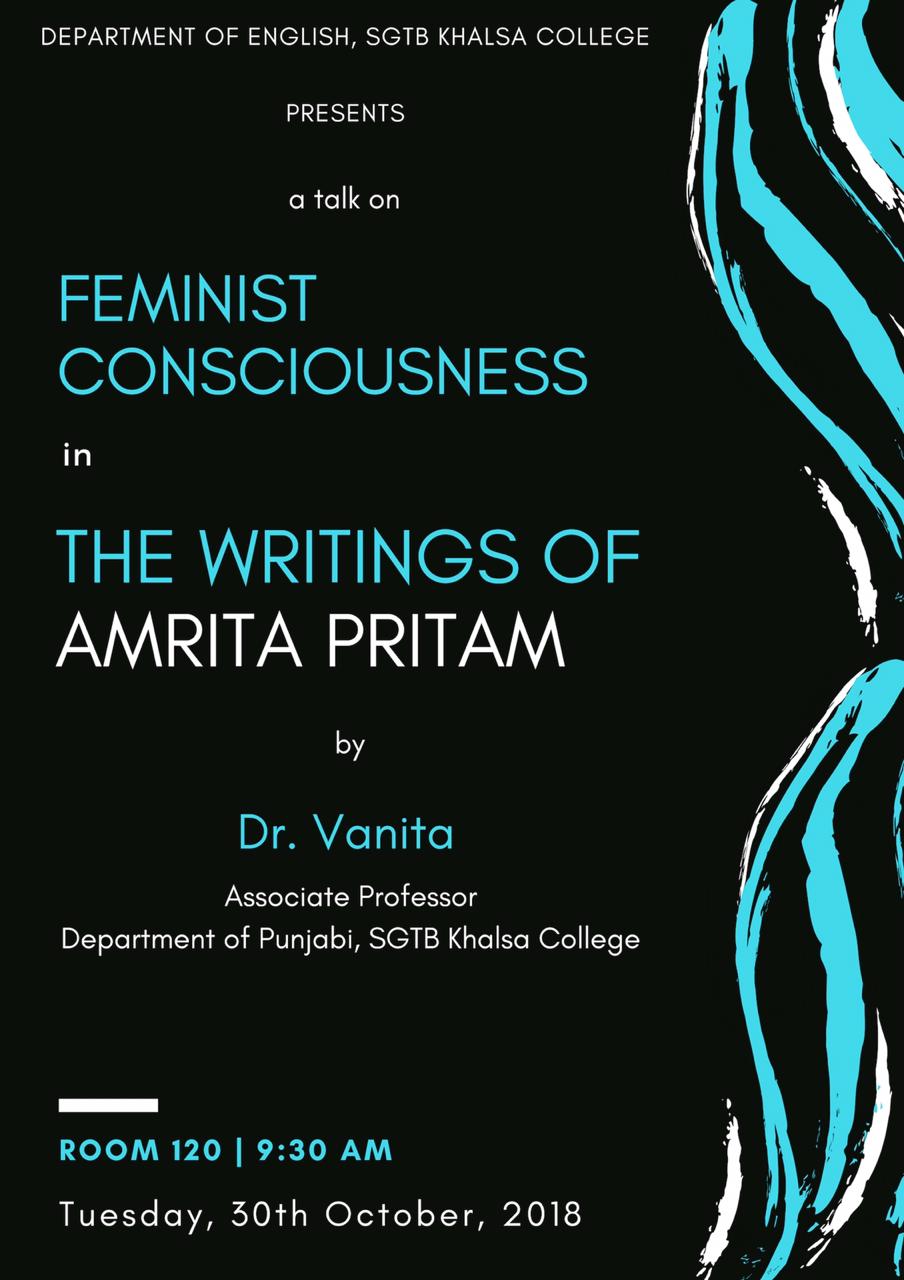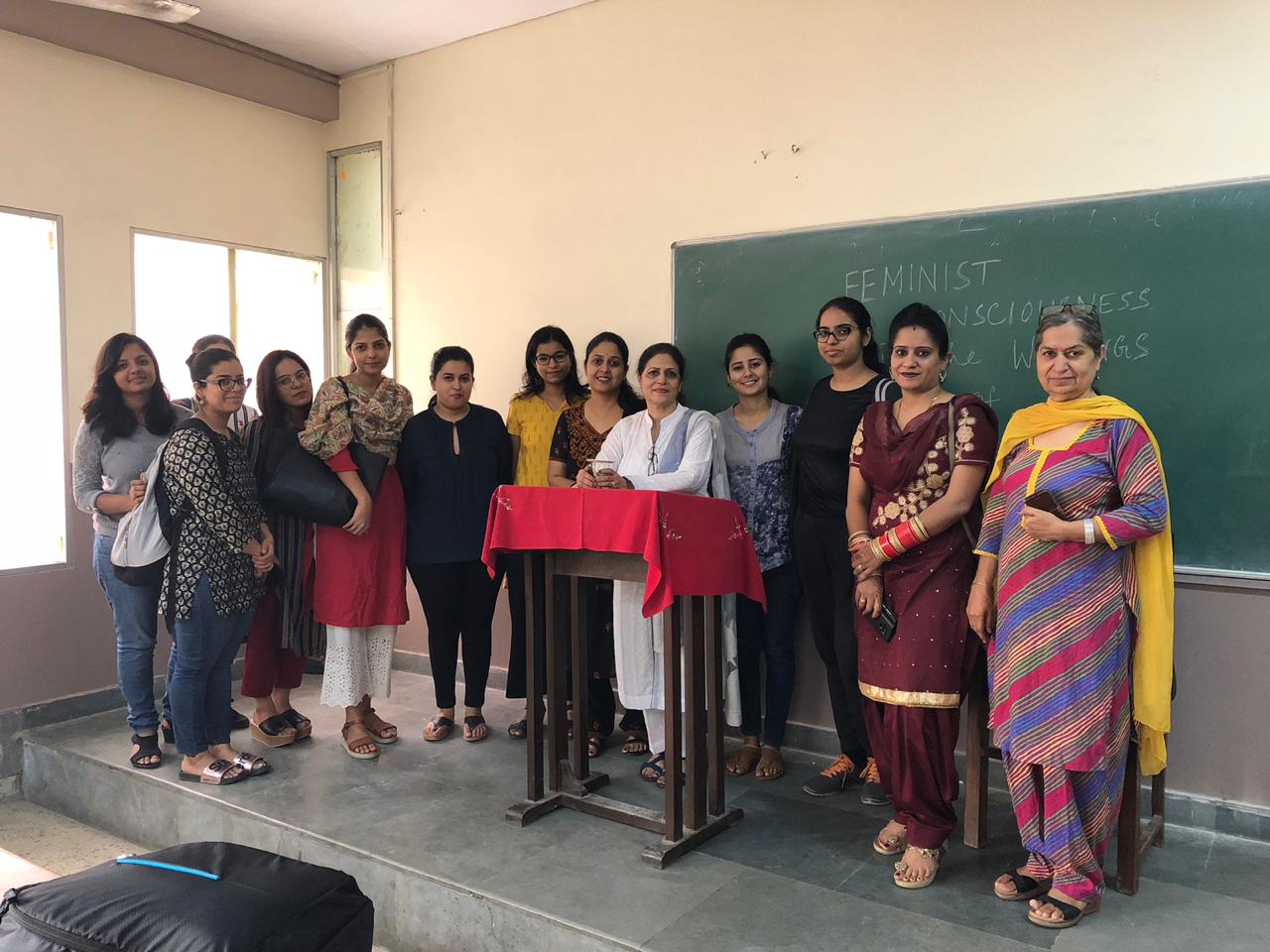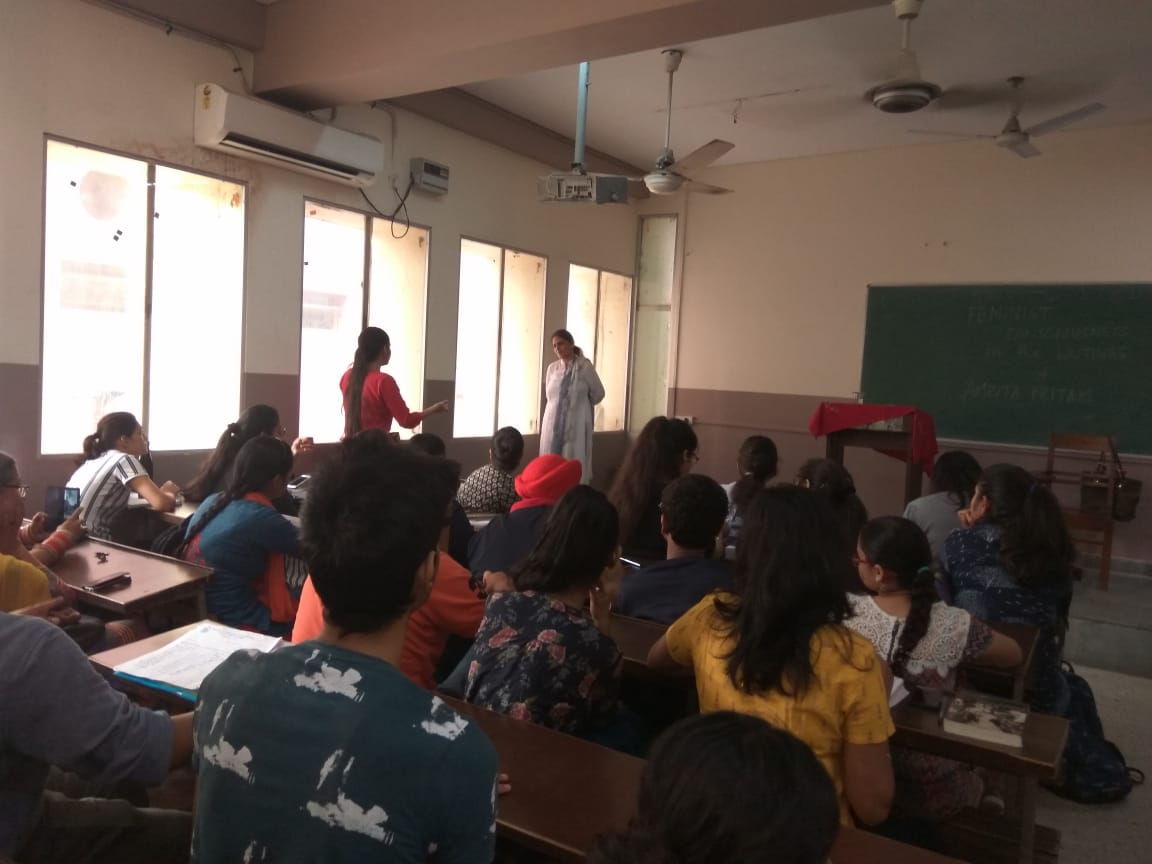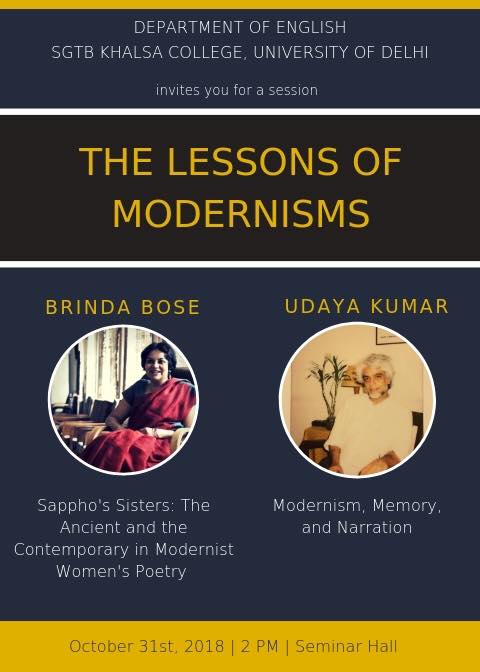2024-25
A talk was organized on February 1, 2024 in the Seminar Hall of the college. This was by the esteemed Professor Tatjana Aleksic (Associate Professor of Comparative and Slavic Literatures and Film, University of Michigan, Ann Arbor, USA) on the critically fascinating topic, "The Literature of Exile: Dubravka Ugresic and East Central European Literature." Professor Aleksic eruditely explicated on the intricate themes of exile within the context of East and Central European literature, with a particular emphasis on the works of Dubravka Ugresic. The talk delved into the complexities of displacement, identity, and cultural alienation portrayed in Ugresic's writings, offering profound insights into human experience of displacement, migration, and exile.
The event was organised under the convenership of Dr. Madhvi Zutshi
The zeal of ‘beyond-the-classroom’ learning continued with a visit to the Partition Museum (Ambedkar University, Delhi) on February 22, 2024, as a collaborative effort between the members of the English and the Punjabi departments. The visit was curated as an outcome of Partition-related texts being taught across both the courses. The students studying Partition Literature in English and Punjabi found a common ground in the shared tragedy of the 1947 Partition of the Indian sub-continent and in the middle of total of around 45 students, an environment was created of multilingual literary exchange, wherein discussions were held on the archives and memories exhibited in the museum, organisation of personal anecdotes, and history, along with literary works from Indian traditions and conventions. It proved to be a very successful excursion widening the expanse of classroom learning and humanising academic discussions and exchange.
The event was organised under the convenership of Dr. Guntasha Kaur Tulsi and Ms. Armeen Kaur Ahuja with inputs and help from Dr. Ravinder Kaur Bedi from the Punjabi Department of the college
The English Literary Society continued to take forward the tradition of learning and holistic educational and creative experiences through organisation of its Annual academic students’ seminar titled, “Literature and the Art of Nonsense: The Nonsense Tradition in Literary Cultures and Visual Medium.” It foregrounded the necessity of researching on the rarely explored area of ‘tradition of the nonsense’ across the literary and the visual medium. The response to the ‘Call-for-Papers’ was tremendous and there was a receipt numerous abstracts from students and research scholars across UG, PG and research level. The event was graced by noted scholars and academics from institutions such as Jamia Millia Islamia, Ambedkar University and University of Delhi.
The wide-ranging papers traversed the spaces of meme-culture; the universe of Lewis Carroll and Sukumar Ray, while also providing reflections on aspects of ‘order’ and ‘dis-order’ in language, connections between language and civilisation and rationality and irrationality. Simultaneously, it touched the purview of films, music, web-series, and internet content. ‘Nonsense’ within the space of Indian literature was also viewed through foregrounding the compositions of medieval Bhakti poet, Kabir; G.V. Desani’s masterpiece, All about H.Hatterr, along with poetic compositions of Nagarjuna (1911-98).
The Seminar provided a novel perspective to the discussion on ‘nonsense’ and the brilliant Keynote Addresses by Prof. Simi Malhotra, (Head- Department of English, Jamia Millia Islamia) and Belinder Dhanoa ( Writer & Pedagogue), along with a vibrant Panel Discussion (comprising of Dr. Benil Biswas, Dr. Priyadarshini Bhattacharyya, Dr. Indrani Dasgupta, Saikat Ghosh and Dr. Guntasha K. Tulsi), widening the contours of ‘nonsense’ and encouraging its understanding across a range of genres, styles and traditions of writing.
The conference was organised by Mr. Saikat Ghosh, Dr. Indulekha P. Roy Burman, Dr. Guntasha Kaur Tulsi, and Ms. Armeen Kaur Ahuja under the convenership of Dr. Guntasha Kaur Tulsi, and Ms. Armeen Kaur Ahuja.
On September 15, Inkspire held “Qafila-e-Irfan” event, which marked the beginning of a journey identifying the mystical ways integral to Sufism. The event, which took place at the historically significant Mehrauli Archaeological Park (Mehrauli), celebrated the universal lessons of love and compassion. With its rich Sufi traditions, the park's scenic environment provided a beautiful backdrop for the day's events and added to the event's spiritual tone.
Inkspire students enthusiastically exchanged poems and works by well-known Sufi authors and poets, along with some self-written pieces encapsulating the spirit of Sufism. Discovering Delhi's long-lost past and recreation of Sufi spirit was energized through the selection of Mehrauli Archaeological Park as a venue; a location rich in historical value, which gave the proceedings greater nuance and authenticity, enhancing the collective experience. The faculty's insights and engagement added a unique perspective, blending historical context with literary appreciation which resonated well with all the attendees.
The event was organised under the convenership of Dr. Guntasha Kaur Tulsi and Dr. Akhilesh Kumar. Dr. Anuradha Gupta, from the Physics Department of the college participated in the event. Dr. Gupta had the following to say after the trip:
"On Sunday, some students from various streams of our college, across all three yrs along with some of us, the faculty, gathered at Mehrauli Archeological Park to start the activities of the literary society, academic calendar in what was aptly named as Qafila - e- Irfan.
The theme was history of Sufi wisdom and Bhakti tradition. The setting was perfect. In that beautiful curated and maintained with wonderful greenery and a jheel behind us, archeological or should I say architectural park among its historical buildings. It was breathtaking scenery. The anchors of the show first recounted the history and heritage of Delhi. It was quite enlightening and I felt was well researched. I can safely say these students are on right path.
I could see the enthusiasm for this kind of research in them. I know such beginnings will take them a long way in their pursuit of academics. The first step in any research project is always writing down the problem and then going full throttle in its pursuit.
Then there was well rehearsed and memorable recitations from collection of Baba Farid, Guru Nanak dev ji, the first Guru in Sikh tradition, Bulle Shah as well as the ancient enlightened poet Rumi. One student from Assam even told us the Bhakti tradition of that region and recited the sufi wisdom from there. A very interesting happening was that some students doing MBA from another university also joined in encouraging our students .
The historical buildings in the complex was another attraction and lots and lots of pictures of the gr as well as individual were taken. Some of the students also went to see the nearby Quatab complex. Overall a beautiful journey with the students. Thank you for this wonderful experience. Not to miss, I also recited some of my self composed couplets.
हमारे साथ चलते हैं
तुम्हारी यादों के साये
चलेंगे साथ तब तक ये
जब तक साँझ ना हो जाए "
The Society organized a thought-provoking panel discussion on “Invoking Gods and Goddesses: Interpreting Mythology and Its Evolution through Indian Literature” on November 20, 2024. The event featured three distinguished speakers - Dr. Namita Sethi from Janki Devi Memorial College, Dr. Animesh Mohapatra from Delhi College of Arts and Commerce, and Dr. Richa Bajaj from Hindu College, each of whom presented nuanced perspectives on the evolving role of mythology in literature and society.
The discussion was initiated with the first speaker, Dr. Namita Sethi (Associate Professor, Department of English, JDMC) initiating through examining the portrayal of goddesses in Indian mythology and its implications for understanding the status of women throughout history. She analyzed the multiplicity of goddess worship, with figures like Durga and Kali embodying diverse facets of femininity, and explored Draupadi’s portrayal in the Mahabharata. Draupadi’s combination of divine attributes and human vulnerabilities was contrasted with Sita’s enduring image as a symbol of patience and grace. Dr. Sethi emphasized that while mythology offers symbolic empowerment for women, its impact on societal norms depends on modern reinterpretation.
Dr. Animesh Mohapatra (Associate Professor, Department of English, DCAC) explored the literary and social contributions of the Bhakti movement, focusing on its devotional practices which challenged caste and gender hierarchies. He highlighted the Tamil Bhakti tradition, particularly the works of Andal, the only female Alvar, and the Vira Shaiva movement led by Basa Vanna, which utilized Kannada devotional literature to advocate equality. Dr. Mohapatra also discussed the linguistic diversity of Bhakti poetry, citing poets such as Tukaram, Mira Bai, and Guru Nanak, who democratized spiritual expression through an inclusive use of regional languages.
Dr. Richa Bajaj (Associate Professor, Department of English, Hindu College) illustrated the continued relevance of ancient and medieval epics in the contemporary world. She utilised citations and analytical readings from the works of early twentieth century writers like Premchand and Shashi Tharoor to examine the connection between subversion and modern retelling of the myths. She examined the use of divine imagery during India’s freedom movement, where leaders invoked gods and goddesses to symbolize unity and resilience. Finally, she highlighted the transition in modern literature from God-centric narratives to human-centric themes, indicating a seminal shift within the discursive strategies.
Post the Discussion, an interjection round was held, inviting fresh perspectives and ideas from the students in the audience, enriching the conversation. The event concluded with awarding of the ‘Best Interjection’ prize to recognise noteworthy and valuable observations of the students.
The event was organised by Dr. Indulekha P. Roy Burman, Dr. Inderpreet Kaur (Guest Faculty), Dr. Guntasha Kaur Tulsi and Dr. Akhilesh Kumar under the convenership of Dr. Guntasha Kaur Tulsi and Dr. Akhilesh Kumar.
The English Department and the Punjabi Department organised a "Literary Translation Workshop" in the seminar room of the college. The workshop was conducted by renowned translators from Punjabi to English. Dr. Amarjeet Kaur (Amia Kunwar), Ms. Sunanda Mehta (Journalist), and Ms. Meera Chadha Borwankar (Retd. IPS Officer) graced the occassion as experts and taught students present the intricacies of translating from Punjabi to other languages. The translation projects were centred around Ms. Sunanda Mehta's translation of Sd. Charan Singh's poetry collection and thus, the workshop incorporated translating not only language but poetry and satire as well.
The event was organised under the convenership of Dr. Ravinder Bedi from the Punjabi Department and Ms. Armeen Kaur Ahuja from the English Department. The organising committee of the event had Prof. Amanpreet Singh Gill, Prof. Harbans Singh,
On February 16, 2025, members of Inkspire, the English Literary society of SGTB Khalsa College, had the privilege of attending a mesmerizing play on Mirza Hadi Ruswa’s classic novel, Umrao Jaan Ada at the prestigious Shri Ram Centre for Performing Arts at Mandi House, New Delhi. The evening was a testimony to the power of theatre in transporting audiences to a bygone era. The elegant architecture and the vibrant atmosphere of the premise was beaming with enthusiastic presence of students and teachers from Inkspire, in addition to a wide range of passionate audience. The auditorium, with its comfortable seating and excellent acoustics, was the perfect setting for an evening of theatre.
The play, directed by Varun Sharma, was a masterful adaptation of the story, set in the nineteenth century, and revolved around the life of Umrao Jaan, a courtesan who rose to fame in the royal courts of Lucknow.The talented cast brought the characters to life with their nuanced performances. The play was interspersed with soulful music and captivating dance performances, which added to the overall charm of the evening. The live musicians created a haunting melody which perfectly complemented the mood of the play.
This outdoor was organised under the Convenorship of Inkspire faculty Convenors, Dr. Guntasha K. Tulsi and Dr. Akhilesh Kumar, under the Department Convenorship of Mr. Ritwick Bhattacharjee.
The two-day Annual Students Seminar of the English Literary Society titled “The ‘End’ as ‘Beginning’: Exploring Narrative Closures and Subversions’’ was held on April 16-17 in the Guru Arjan Dev Seminar Hall, SGTB Khalsa College. Prof. Ira Raja (Professor, Department of English, University of Delhi) was the Keynote Speaker and she beautifully explored the relationship between genre, literary form and structural lineaments of writings within the space of gerontology. The two-day Seminar was presided by peer-reviewers across three panels: Prof. Mona Sinha (Associate Professor, Department of English, Maharaja Agrasen College, University of Delhi), Prof. Madhumita Chakraborty (Professor, Department of English, Zakir Hussain Delhi College- Evening, University of Delhi) and Dr. Sanjukta Naskar (Associate Professor, Department of English, Janaki Devi Memorial College, University of Delhi).
The event was well-represented by presentations of scholars across prominent Universities like Shiv Nadar, Jamia Millia Islamia, Ambedkar University, JNU and colleges across Delhi-NCR. The presenters’ efforts were hugely lauded and the Mentorship Model on which the selection and guidance of papers was based, involved reflection, re-configuration and improvisation by the scholars, leading to a qualitative jump in their execution and delivery.
The Newsletter of the English Literary Society was released on the second day cataloguing all-round year achievements and milestones achieved by the Society. The second day also comprised of the ‘Valedictory’ where the society members, volunteers and paper-presenters were felicitated for their year-round contribution and for also getting together in making this event a stupendous success. The Faculty Mentors and Organising Committee of the Seminar comprised of Dr. Akhilesh Kumar, Dr. Guntasha K. Tulsi and Mr. Ritwick Bhattacharjee.
2023-24
An English Language Proficiency Workshop was conducted for students of Physics (Hons.) in the Physics Department of the college. This two-day Workshop arose out of the need of correcting gaps in language-based-proficiency and writing skills of Physics students and was divided into four sessions across two days.. Utilising a combination of audio-video clippings, hand-outs, power-points, and other related props, the two resource persons from the English Department (Dr. Guntasha K. Tulsi and Ms. Armeen K. Ahuja), brilliantly addressed the diverse needs and queries of students through a combination of creative and academic tools.
The event was organised by Prof. Mamta and Dr. Nimmi Singh from the Physics department along with Dr. Guntasha Kaur Tulsi and Ms. Armeen Kaur Ahuja from the English department.
An outdoor trip titled, Majlis-e-Malfuzat: Reading Delhi through Literature, a heritage walk-cum-reading session, was organized in the Madarsa ruins of Hauz Khas complex. The event was enthusiastically joined by an eclectic mix of students from social science disciplines, and they performed specially designed literary pieces, within the majlis. These selections spanned various genres, including excerpts, anecdotes, poems, short lyrics, and graffiti from Delhi walls. The selected pieces ranged from medieval to modern literature and covered authors and poets like Amir Khusro, Sarojini Naidu, Krishna Sobti and Ravish Kumar.
The event was organised under the convenership of Dr. Gutasha Kaur Tulsi and Ms. Armeen Kaur Ahuja
The literary societies of the English department, in collaboration with the Punjabi department, organised a memorable book-launch of renowned writer Sarbpreet Singh’s Sufi’s Nightingale (Publisher: Speaking Tiger Books, Delhi) in the Seminar Hall of the college. The book-launch comprised of a memorable Sufi rendition by the students and was followed by a discussion with the writer and an overview provided by him of his immensely well-received work. He touched on aspects like relevance of historical fiction, value of Sufi mysticism and exploration of love and companionship from a unique perspective.
The event was organised by Prof. Gurinder Singh and Dr. Gurdeep Kaur Sura from the Punjabi Department and Dr. Guntsha Kaur Tulsi and Ms. Armeen Kaur Ahuja from the English Department. Prof. Amanpreet Singh Gill served as a moderator of the session as well.
A talk titled, “Poetics and Politics of War in Cilappatikaram” by Prof. B. Mangalam (Professor, Department of English, Aryabhatta College) was organised on October 27, 2023, in the Sri Guru Arjan Dev Seminar Hall of the college. The seminar garnered a significant audience with participation of students from other colleges, demonstrating the intellectual enthusiasm and synergy within the academic community. Prof. B. Mangalam delved into the intricacies of Cilappatikaram, providing a brief overview of all the cantos, while shedding light on the underlying politics of deification within the epic. Furthermore, she emphasized on the resonance of the epic in the contemporary times, drawing parallels to the current geo-political landscape The event served as a platform for scholarly dialogue and exchange of ideas pertaining to ancient literature, art, and culture.
The event was organised under the convenership of Dr. Gutasha Kaur Tulsi and Ms. Armeen Kaur Ahuja
2022-23
The English Literary Society invited research papers from universities all over India for its paper presentation on “Love, Longing, and Technology.” Students, selected by the conveners, presented thoroughly insightful papers on the theme. Points of discussion included concepts like identity, space and culture & mediums like film, music, anime, and video games. The presentations were followed by a Q&A session where the society members and other attendees engaged with the presenters about their specific areas of concern.
In light of the university’s reopening, the seminar was hosted offline in the college auditorium and was opened with a panel discussion. The panel discussion was led by the esteemed Ms Saloni Sharma and Ms Zahra Rizvi, who offered interesting insights about human interaction with technology in different spheres of life. Professors Ashwin Rajeev and Shweta Khilnani participated in the discussion and inducted students to engage with the panelists.
The event was organised under the convenership of Mr. Ashwin Rajeev and Ms. Shweta Khilnani.
An online flash fiction competition, titled "Poesis", was conducted by the English Literary Society on the theme of Love and Longing in the New Age. Participants were provided with a literary prompt and had to craft a flash fiction incorporating it. The prompt was as follows: "You can transmute love, ignore it, muddle it, but you can never pull it out of you"
The event was organised under the convenership of Mr. Ashwin Rajeev and Ms. Shweta Khilnani.
The English Literary Society started the Spotlight initiative in October 2021. The idea was to pick specific themes from the English curriculum every month and bring to the spotlight a few select works of literature and cinema that could be studied under the overarching umbrellas of the themes chosen. The essence of the initiative was to provide the society members and our Instagram audience exposure to works of literature and cinema from all over the world while also providing them with an intersectional space to assess the treatment of the chosen themes across the two mediums and the numerous works of art belonging to each of them.
Keeping up with the spirit of the Halloween season, for our first spotlight in October 2021, we chose the vastly popular theme of ‘Gothic Horror’. Characterized by solitude and a dense atmosphere of fear, the elements of wonder, terror, psychological overlay, death, and often romance are commonplace conventions of this elusive category of literature. The film and book chosen to be spotlighted were Dario Argento’s supernatural horror Suspiria and Carmen Maria Machado’s memoir In the Dream House.
In light of the webinar we did on Persian poet Simin Behbahani, we chose ‘Representation of Women in 21st Century Middle Eastern Literature and Cinema’ as our theme for November 2021. Although films made in the Middle East are quite well known and renowned in film festival circuits, the dominant albeit hollow image of the Middle Eastern woman and issues concerning her has been created by the patriarchal film industries of the West. It is this very image that 21st-century Middle Eastern cinema and literature seek to deconstruct and reform. The film and book chosen to be spotlighted were Jafar Panahi’s Offside and Elif Shafak’s 10 Minutes 38 Seconds in This Strange World.
Instead of a conventional Spotlight in December 2021, we decided to build our posts upon our holiday-season collaboration with Letters to Strangers Chhattisgarh and recommend our Instagram audience films like Ingmar Bergman’s poignant Fanny and Alexander to watch and books like Charles Dickens’ fantastic novella A Christmas Carol to read in the comfort of their homes.
Following up, we decided to build a Spotlight around the freshers who were recently inducted into the society by going ahead with ‘Resonances of Greek Mythology in Contemporary Cinema and Literature’ as our central theme. Myths have, for the longest time, developed and shaped our understanding of the world around us and Greek mythology, more than any other, has been instrumental in shaping the modern Western sensibility. Its echoes can be found in most canonical works of Western art and its whispers in every storyteller’s imagination. The film chosen to be spotlighted was the Coen Brothers’ O Brother, Where Art Thou?, their darkly humorous retelling of Homer’s Odyssey & the book chosen was Madeline Miller’s highly famous Circe.
Finally, in February 2022, we created our Spotlight posts on the theme of ‘Representation of LGBTQIA+ in 21st-Century Literature and Cinema’. For the longest time, queer people have been grossly underrepresented and often mischaracterized in works of all mediums, particularly literature and cinema. Widespread movements in the second half of the twentieth century and the onset of the twenty-first brought about a major paradigm shift in queer representation with densely layered characters that go far beyond the envelopes of stereotypes and caricatures. The writers and filmmakers of the 21st century continue to push boundaries, and claim for themselves a space to create and tell fluid, empathetic stories about queer individuals; broadening the societal understanding of gender identity and sexuality. The film and book chosen to be spotlighted were Greg Berlanti’s tender romantic comedy Love, Simon, and Alice Oseman’s graphic novel series Heartstopper.
The event was organised under the convenership of Mr. Ashwin Rajeev and Ms. Shweta Khilnani.
2021-22
The department organised a one day online seminar titled "The Art of Mystery". The seminar focused on the intricacies of and formulas of detective fiction and saw a keynote address by Prof. Christel Devadawson. Following the keynote, there were 4 student paper presentations, selected by the faculty of the department. Each paper dealt with and soought to interrogate a different aspect of detective fiction.
The event was organised under the convenership of Mr. Ashwin Rajeev and Ms. Shweta Khilnani.
Halloween brings an aura of eeriness and a plethora of ghosts, vampires, and all sorts of creatures with it. Keeping up with the spirit of Halloween in October 2021, the English Literary Society of the department hosted An Eldritch Carnevil, a two-part online event revolving around all things eerie, uncanny, and strange. The event saw talks, competitions, film screenings, and interactions on all things Halloween.
The event was organised under the convenership of Mr. Ashwin Rajeev and Ms. Shweta Khilnani.
The English Literary Society of the department organised a poetry competition titled "Graveyard Poets: A Blackout Poetry". It required participants to read excerpts from popular works of horror literature closely and redact and blacken out words from said excerpts to create a cohesive piece of poetry. The excerpts were taken from Dracula by Bram Stoker, Frankenstein by Mary W. Shelly and Red Dragon by Thomas Harris.
The event was organised under the convenership of Mr. Ashwin Rajeev and Ms. Shweta Khilnani.
The English Literary Society organised a unique event titled Les Échanges Mystérieux on Twitter. It was an engaging twitter-themed event which allowed participants to unfetter their dialogic creativity and transform their perceptions of popular figures in horror like Hannibal Lecter and Count Dracula into pieces of twitter interactions between two or more such characters.
The event was organised under the convenership of Mr. Ashwin Rajeev and Ms. Shweta Khilnani.
In November 2021, the English Literary Society organized a webinar on the poetry of Persian poet Simin Behbahani. The webinar was led by special invitee Ms. Ghazal Zargar Amini who discussed Behbahani’s poem ‘It’s Time to Mow the Flowers’ in-depth and provided insight into the evolving socio-political, cultural and poetic landscape of Iran. The session was then carried forward by Professor Akhlaque ‘Ahan’ of the Centre of Persian and Central Asian Studies, Jawaharlal Nehru University.
The event was organised under the convenership of Dr. Madhvi Zutshi
In November 2021, the English Literary Society collaborated with professors from the Department of English to organize a webinar on Tulsidas' SriRamacaritamanasa and Somadeva's Kathasaritsagara. The webinar was led by the renowned writer and literary translator Rohini Chowdhury who discussed various literal, cultural and historical aspects of the literary works in two extremely enlightening sessions.
The event was organised under the convenership of Dr. Akhilesh Kumar
2020-21
With the covid lockdown in full force, the department shifted its activities online and the first event was a talk titled "Understanding the Language of Cinema" delivered by Abhija Ghosh. She spoke about the basics of reading cinema and how the form presents unique challenges towards its reading and meaning making.
The event was organised under the convenership of Mr. Ritwick Bhattacharjee
The department organised an online talk by Dr. Sanchita Khurana, Assistant Professor in English at Deshbandhu College titled "Modernism: Visual(s) and Visuality". The talk focused on how the visual medium evolved through the early 20th century Europe and took on the project of modernity.
The event was organised under the convenership of Mr. Ritwick Bhattacharjee.
2019-20
A Legal Literacy Workshop was organised by the Department for the students studying the GE paper "Contemporary Indian and Women Empowerment". The workshop was conducted by Ms. Soumya Bharadwaj, a Judicial Magistrate at the Hapur District Court. Her lecture encompassed the succession and protection laws made for women.
The event was organised by Ms. Anuroop Kaur Sandhu and Mr. Ritwick Bhattacharjee under the convenership of Dr. Madhvi Zutshi.
The Department organised a short story writing competition sponsored by OnePlus. There were over a hundred entries submitted from the same. Of those, the faculty members of the department selected two best stories who were then awarded with prizes offered by OnePlus.
The event was organised under the convenership of Dr. Madhvi Zutshi.
2018-19
A Legal Literacy Workshop was organised by the Department for the students studying the GE paper "Contemporary Indian and Women Empowerment". The workshop was conducted by an eminent Women's Rights Lawyer Shubhra Mendiratta. She spoke about Indian laws drafted specifically for women to allow them to find legal reparations. Ms. Mendiratta discussed several cases which she had fought to explain to the students how law works to help women in need.
The event was organised by Ms. Anuroop Kaur Sandhu and Mr. Ritwick Bhattacharjee under the convenership of Dr. Madhvi Zutshi.
The Department organised a talk on Thomas De Quincey by inviting Prof. Jennifer Wawrzinek. Prof. Wawrzinek was Acting Chair of New English Literatures at the University of Potsdam. She has been a British Academy Visiting Research Fellow to the University of London and an ARC Visiting Fellow to the Centre for the History of Emotions in Melbourne. She is the author of Ambiguous Subjects: Dissolution and Metamorphosis in the Postmodern Sublime (Rodopi 2008) and the recently completed monograph entitled Beyond Identity: Romanticism and Decreation.
The work of late Romantic Thomas De Quincey is generally understood as unashamedly upholding the glories of the British Empire whilst simultaneously portraying those from other cultures (such as Chinese, Malay, or Indian, for example) as inhering a threatening otherness with the potential to unleash a dangerous violence. Yet De Quincey's insistence throughout his work, and most significantly in the "Mail Coach" essay, on the affective power of the body as a means of forging sympathetic engagements with others (in the first instance as a means of producing a united national sentiment), ends up unsettling, rather than reconfirming, De Quincey's putative alliance of self and Empire. In addition, the initial intention to include the "Mail Coach" essay into De Quincey's major work, Suspiria de Profundis, in which De Quincey uses the trope of the palimpsest as a means of configuring memory, and thus history, further unsettles the structuring of Empire as a neat unidirectional dissemination of power. More-over, just as the murder essays have been shown to critique a Kantian disinterestedness as the basis of aesthetic judgement. Prof. Wawrzinek argued that De Quincey's sympathetic engagements inadvertently portray the great machine of Empire as structurally similar to his concept of the palimpsest, whereby those others that Empire would silence necessarily remain as a disruptive and potentially transformative presence.
The event was organised under the convenership of Dr. Madhvi Zutshi.
The department, in association with the Department of Punjabi, Sri Guru Tegh Bahadur Khalsa College organised a small talk on the Feminist Consciousness in the Writings of Amrita Pritam. The talk was delivered by Dr Vanita, Associate Professor at the Department of Punjabi of the college and a renowned translator from Punjabi. The talk focused on how Amrita Pritam's works present a challenge to the ways of the patriarchal world; thus introducing students to the gender-politics of Punjabi writing.
The event was organised under the convenership of Dr. Indulekha P. Roy Burman.
The Department organised a one day conference titled "The Lessons of Modernism". The first half of the day saw engaging talks on Modern Literary Artefacts by Prof. Brinda Bose and Prof. Udaya Kumar; both eminent scholars and Faculty at CES, JNU. While Prof. Bose spoke about the 20th century receptions and readings of Sappho, Prof. Kumar spoke about memory and James Joyce's novels. The second half of the conference had a line-up of student scholars from the college and the university who presented their papers on the different aspects and literatures of the modern period. Each student paper was selected and curated by the members of the department to ensure quality and an indepth engagement with the topic.
The event was organised by Mr. Chinmaya Lal Thakur and Mr. Saikat Ghosh under the convenership of Dr. Madhvi Zutshi.




